

What are Research Skills? How to Improve Your Skills in Research
Learn strategies and techniques to improve your research skills. Avoid common mistakes and implement proven methods for efficient research. This article offers practical tips to enhance your ability to find and evaluate high-quality information.

Are you struggling to find relevant and reliable information for your research? Do you want to avoid getting lost in a sea of sources and needing help knowing where to start? Improving your research skills is essential for academic success and professional growth.
In today's information age, effectively conducting research has become more important than ever. Whether you are a student, a professional, or simply someone who wants to stay informed, knowing how to find and evaluate information is crucial.
Fortunately, some strategies and techniques can help you improve your research skills and become a more efficient and effective researcher. By avoiding common mistakes and implementing proven methods, you can enhance your ability to find high-quality information and make the most of your research endeavors. This article will explore some practical tips and tricks to help you improve your research skills and achieve better results.
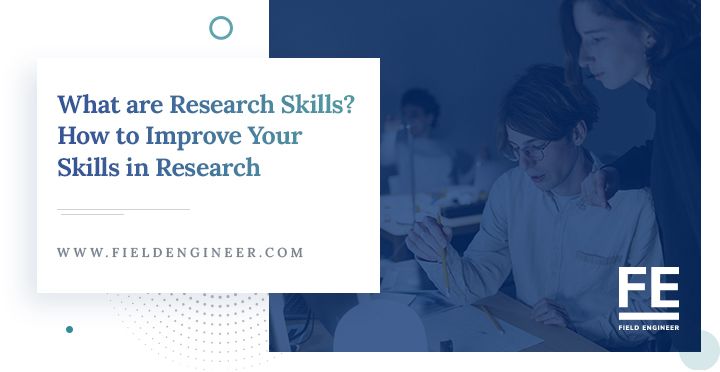
What is Research?
Research is a critical part of learning, problem-solving, and decision-making. It is an essential process used in every field for both the individual and collective’s mutual benefit and success. Research involves systematically gathering data from primary or secondary sources, analyzing it, interpreting it, and communicating its findings to researchers and other interested parties.
Research can be divided into two main categories: quantitative research, which uses numerical data to describe phenomena, and qualitative research, which seeks to understand people's beliefs, opinions, values, or behaviors. Quantitative research often involves applying model-based approaches that can predict outcomes based on observations. It is one of the most powerful methods of discovering information about the world, as it allows for testing hypotheses in a systematic manner. Qualitative research is more exploratory in nature by focusing on understanding the motivations behind what people do or think rather than developing models or producing statistics in order to conclude behavior and relationships between variables. This type of research usually relies more on observation and engagement with people instead of using statistical models.
What are Research Skills?
Research skills are the abilities and talents required to focus on an objective, gather the relevant data linked to it, analyze it using appropriate methods, and accurately communicate the results. Taking part in research indicates that you have acquired knowledge of your subject matter, have digested that knowledge, and processed, evaluated, and analyzed it until you can resolve a problem or answer a query. It is highly beneficial for employers to hire people with strong research skills since they can provide valuable insights and add value to the company’s performance. Therefore, researching effectively has become crucial to securing a job in most industries.
Why Do Research Skills Matter?
Research skills are essential if one intends to succeed in today's competitive world. With technology ever-evolving and a need to stay ahead of the competition, employees who possess research skills can prove invaluable to their employers. These skills include researching, analyzing, and interpreting data and making informed decisions based on that information.
Employers value workers who can quickly develop a thorough understanding of any changes or trends in their field of work through accurate research. Knowing how to assess customer needs, recognize competition, write reports, improve productivity, and advise on investments can also benefit any business. With the help of research skills, companies can uncover ways to adapt their services or products that better serve their customers’ needs while helping them save money at the same time. This makes overall operations more efficient as well as helps a company remain ahead of its competitors.

Essential Research Skills :
Here is a list of essential research skills:
Data Collection
Data collection is an important part of comprehending a certain topic and ensuring reliable information is collected while striving to answer complex questions. Every situation differs, but data collection typically includes surveys, interviews, observations, and existing document reviews. The data collected can be quantitative or qualitative, depending on the nature of the problem at hand. As students advance through university and other educational institutions, they will need to read extensively into a particular field and may even need to undertake comprehensive literature reviews to answer fundamental questions.
The skills acquired through data collection during university are invaluable for future roles and jobs. Gaining experience in understanding complex topics, reading widely on a given subject matter, collecting relevant data, and analyzing findings - all these activities are integral when dealing with any type of project within the corporate sector. Therefore, embarking on various research projects enhances a person's education level and brings about significant professional experience.
Goal-Setting
Setting goals is an important skill for any successful research project. It allows you to stay focused and motivated throughout the process. Goals are also essential in helping with direction: they provide a path to organize our thoughts, narrow our focus, and prioritize the tasks we need to undertake to achieve our desired result. The concept of goal-setting is inherent in most research processes, as everything needs to have something to strive for — whether that’s gaining knowledge about a particular topic or testing a theory.
When it comes to creating and setting goals during the research process, you must have clear and specific objectives in mind from the outset. Writing down your thoughts helps define these objectives, which can inform the data collection process; moreover, thinking about short-term and long-term goals can help you create manageable steps toward achieving them. Learning how to break up larger projects into smaller “mini-goals effectively” can make all the difference when tackling complex investigations — allowing researchers to monitor their progress more easily and culminate results further down the line.
Critical Thinking
Critical thinking is an integral part of the modern workplace. To succeed, one must be able to look at a situation objectively and make decisions based on evidence. The information examined needs to come from various sources, such as data collection, personal observation, or analysis. The goal should then be to take all this information and form a logical judgment that informs an action plan or idea.
Someone who displays strong critical thinking skills will not just accept proposed ideas at face value but instead can understand how these ideas can be applied and challenged. Accepting something without consideration means making the wrong decision due to a lack of thought. Critical thinkers understand how brainstorming works, assessing all elements before forming any decision. From negotiating with colleagues or customers in adversarial scenarios to analyzing complex documents such as legal contracts in order to review business agreements - critical dedicated apply their knowledge effectively and are able to back up their evaluation with evidence collected from multiple sources.
Observation Skills
Observation skills are necessary for conducting any form of research, whether it be in the workplace or as part of an investigative process. It is important to be able to pick up on the details that might otherwise pass unnoticed, such as inconsistencies in data or irregularities in how something is presented, and to pay careful attention to regulations and procedures that govern the company or environment. This can help researchers to ensure their processes are accurate and reliable.
As well as analyzing what we see around us directly, many research methodologies often involve calculated statistical analyses and calculations. For this reason, it’s important to develop strong observation skills so that the legitimacy of information can be confirmed and checked before conclusions are formed. Improving this skill requires dedication and practice, which could include keeping a journal reflecting on experiences, posing yourself questions about what you have observed, and seeking out opportunities in unfamiliar settings to test your observations.
Detail Orientation
Detail orientation is an important research skill for any scientific endeavor. It allows one to assess a situation or problem in minute detail and make appropriate judgments based on the information gathered. A detail-oriented thinker can easily spot errors, inconsistencies, and vital pieces of evidence, which can help lead to accurate conclusions from the research. Additionally, this skill allows someone to evaluate the quality and accuracy of data recorded during an experiment or project more efficiently to ensure validity.
Spotting small mistakes that may otherwise have been overlooked is a crucial part of conducting detailed research that must be perfected. Individuals aiming for superior outcomes should strive to develop their skill at detecting details by practicing critical analysis techniques, such as breaking down large bodies of information into smaller tasks to identify finer points quickly. Moreover, encouragement should also be made for elaborate comparison and analysis between different pieces of information when solving a complex problem, as it can help provide better insights into problems accurately.
Investigative Skills
Investigative skills are an essential component when it comes to gathering and analyzing data. In a professional setting, it is important to determine the accuracy and validity of different sources of information before making any decisions or articulating ideas. Generally, effective investigation requires collecting different sets of reliable data, such as surveys and interviews with stakeholders, employees, customers, etc. For example, if a company internally assesses possible challenges within its business operations environment, it would need to conduct more profound research involving talking to relevant stakeholders who could provide critical perspectives about the situation.
Data-gathering techniques such as comparison shopping and regulatory reviews have become more commonplace in the industry as people strive for greater transparency and more accurate results. Knowing how to identify reliable sources of information can give individuals a competitive advantage and allow them to make sound decisions based on accurate data. Investing time in learning different investigative skills can help recruiters spot applicants dedicated to acquiring knowledge in this field. Developing these investigative skills is also valuable for those looking for executive positions or starting their own business. By familiarizing themselves with their application process, people can become adept at collecting high-quality data they may use in their research endeavors.
Time Management
Time management is a key skill for any researcher. It's essential to be able to allocate time between different activities so you can effectively plan and structure your research projects. Without good time management, you may find yourself hastily completing tasks or feeling stressed out as you rush to complete an analysis. Ultimately, managing your time allows you to stay productive and ensure that each project is completed with the highest results.
Good time management requires various skills such as planning ahead, prioritizing tasks, breaking down large projects into smaller steps, and even delegating some activities when possible. It also means setting realistic goals for yourself in terms of the amount of research that can be achieved in certain timestamps and learning how to adjust these goals when needed. Becoming mindful of how you spend the same hours each day will propel your productivity and see positive results from your efforts. Time management becomes especially relevant regarding data collection and analysis – it is crucial to understand precisely what kind of resources are needed for each task before diving into the research itself. Knowing how much time should be dedicated to each step is essential for meeting deadlines while still retaining accuracy in the final outcomes of one’s study.
Tips on How to Improve Your Research Skills
Below are some tips that can help in improving your skills in research:
Initiate your project with a structured outline
When embarking on any research project, creating an outline and scope document must first ensure that you remain on the right track. An outline sets expectations for your project by forming a detailed strategy for researching the topic and gathering the necessary data to conclude. It will help you stay organized and break down large projects into more manageable parts. This can help prevent procrastination as each part of the project has its own timeline, making it easier to prioritize tasks accordingly.
Using an outline and scope document also allows for better structure when conducting research or interviews, as it guides which sources are most relevant, what questions need to be answered, and how information should be collected or presented. This ensures that all information received through research or interviews stays within the confines of the chosen topic of investigation. Additionally, it ensures that no important details are overlooked while minimizing the chance that extraneous information gets included in your results. Taking this time upfront prevents potential problems during analysis or reporting of findings later.
Acquire expertise in advanced data collection methods
When it comes to collecting data for research purposes, a range of advanced data collection techniques can be used to maximize your efficiency and accuracy. One such technique is customizing your online search results with advanced search settings. By adding quotation marks and wildcard characters to the terms you are searching for, you are more likely to find the information you need from reliable sources. This can be especially useful if, for instance, you are looking for exact quotes or phrases. Different search engines require different advanced techniques and tactics, so learning these can help you get more specific results from your research endeavors.
Aside from using online searches, another standard methodology when conducting research is accessing primary information through libraries or other public sources. A specific classification system will likely be in place that can help researchers locate the materials needed quickly and easily. Knowing and understanding this system allows one to access information much more efficiently while also giving them ample opportunity to increase their knowledge of various topics by browsing related content in the same category groups. Thus, by learning about advanced data collection techniques for both online and offline sources, researchers can make substantial progress in their studies more efficiently.
Validate and examine the reliability of your data sources
Collecting reliable information for research can be a challenge, especially when relying on online sources. It is essential to remember that not all sources are created equal, and some sites may contain false or inaccurate data. It is, therefore important to verify and analyze the data before using it as part of your research.
One way to start verifying and analyzing your sources is to cross-reference material from one source with another. This may help you determine if particular facts or claims are accurate and, therefore, more valid than others. Additionally, trace where the data is coming from by looking at the author or organization behind it so that you can assess their expertise in a particular field and authority on the topic at hand. Once these steps have been completed, you can confidently use this trusted information for your project.
Structure your research materials
Organizing your research materials is an integral part of any research process. When you’re conducting a project or study and trying to find the most relevant information, you can become overwhelmed with all the data available. It’s important to separate valid from invalid materials and to categorize research materials by subject for easy access later on. Bookmarking websites on a computer or using a digital asset management tool are two effective methods for organizing research information.
When researching, it’s critical to remember that some sources have limited value and may be outside the scope of your topic. Recognizing reliable material versus trustworthy resources can be complex in this sea of information. However, sorting data into appropriate categories can help narrow down what is necessary for producing valid conclusions. This method of classifying information helps ensure that vital documents aren't overlooked during the organization process as they are placed in folders shortcutted for quick access within one centralized source whenever needed. Separating valuable sources also makes it easier to reference later on when writing reports or giving presentations - material won't get lost among irrelevant data, and conclusions will be backed by sound evidence.
Enhance your research and communication capabilities
Developing research and communication skills is essential for succeeding academically and professionally in the modern world. The key to improving these skills lies in rigorous practice, which can begin with small projects such as resolving common issues or completing a research task that can be made into a personal project. One way to do this is to volunteer for research projects at work and gain experience under the guidance of experienced researchers. This will improve your research skills and help you develop communication skills when working with others on the project. Another option is to turn a personal project into a research task. For example, if you plan on taking a holiday soon, you could create an objective method to select the best destination by conducting online research on destinations and making informed decisions based on thorough analysis. Practicing in this way enables you to complete any research task confidently and communicate efficiently with ease.
How to Articulate Research Skills on Your Resume
Research projects require commitment and perseverance, making it an important skill to include on a resume. Even if you have had limited research experience throughout your education or previous job, including this in your resume assesses these qualities to potential employers. It's important to consider the extent of your research experience when deciding how to add this part of your background to your resume. If you have been involved with multiple in-depth research projects, it might be best to highlight this by including it as its own section. On the other hand, if the amount of research you have completed is more limited, then try including it in the skills section instead.
When adding research experience and accomplishments into either section of your resume, be sure to emphasize any specific roles or contributions you made during the process instead of just describing the project itself. Furthermore, remember to quantify any successes where possible - this showcases both communication and technical proficiency strengths, which can help make your resume stand out even more. By properly articulating research skills within a resume, employers will likely be more interested in what job seekers have accomplished in their careers.

How to Apply Research Skills Effectively in Your Workplace
Research skills are an invaluable set of abilities to bring to your workplace. To make sure you use them properly, a good place to start is by taking time to plan the project you have been assigned. Whether it’s writing a report or analyzing data, mapping out what tasks you need to do and how long they should take helps to understand the project timeline better. This also makes setting aside dedicated time for research easier too.
To ensure that the decisions made are sound and informed, reading up on the subject area related to the project remains one of the premier ways of doing this. This will help to ensure that any problems arising can be solved quickly and effectively, as well as provide answers before any decisions are actually put into practice. By arming yourself with knowledge gathered through reading about a particular topic, it can give you more confidence when formulating plans or strategies in which direction to take your work in.
Final Thoughts
Research skills are increasingly important in the modern world, and gaining proficiency in this area can significantly benefit a person's career. Research skills are essential for success in many different roles and fields, including those within business and industry, education, science, and medicine. Developing a deep understanding of research allows us to identify problems better and critically evaluate potential solutions. It also bolsters our problem-solving abilities as we work to find creative solutions that meet our efforts' objectives.
By improving your research capabilities, you can impress employers during an application process or when joining a team at work. Research skills are considered soft skills by potential employers since they signal that you have attention to detail while simultaneously demonstrating your ability to learn new things quickly. Employers regard these skills highly, making them one of the key graduate career skills recruiters seek. Furthermore, being able to add ‘research skills’ to your CV will be looked upon favorably by employers and help drive up your employability significantly. Demonstrating that you possess these sought-after traits makes it easier for recruiters to give you the opportunity you've been looking for, so it's worth investing the time into developing these life-long learning tools today.
How do I resolve any dispute

Effective Job Search Strategies That Work To Land Your Dream Role

How to Choose Between Two Job Offers? Tips to Help You Decide the Right Opportunity
15 Steps to Good Research
- Define and articulate a research question (formulate a research hypothesis). How to Write a Thesis Statement (Indiana University)
- Identify possible sources of information in many types and formats. Georgetown University Library's Research & Course Guides
- Judge the scope of the project.
- Reevaluate the research question based on the nature and extent of information available and the parameters of the research project.
- Select the most appropriate investigative methods (surveys, interviews, experiments) and research tools (periodical indexes, databases, websites).
- Plan the research project. Writing Anxiety (UNC-Chapel Hill) Strategies for Academic Writing (SUNY Empire State College)
- Retrieve information using a variety of methods (draw on a repertoire of skills).
- Refine the search strategy as necessary.
- Write and organize useful notes and keep track of sources. Taking Notes from Research Reading (University of Toronto) Use a citation manager: Zotero or Refworks
- Evaluate sources using appropriate criteria. Evaluating Internet Sources
- Synthesize, analyze and integrate information sources and prior knowledge. Georgetown University Writing Center
- Revise hypothesis as necessary.
- Use information effectively for a specific purpose.
- Understand such issues as plagiarism, ownership of information (implications of copyright to some extent), and costs of information. Georgetown University Honor Council Copyright Basics (Purdue University) How to Recognize Plagiarism: Tutorials and Tests from Indiana University
- Cite properly and give credit for sources of ideas. MLA Bibliographic Form (7th edition, 2009) MLA Bibliographic Form (8th edition, 2016) Turabian Bibliographic Form: Footnote/Endnote Turabian Bibliographic Form: Parenthetical Reference Use a citation manager: Zotero or Refworks
Adapted from the Association of Colleges and Research Libraries "Objectives for Information Literacy Instruction" , which are more complete and include outcomes. See also the broader "Information Literacy Competency Standards for Higher Education."

What Are Research Skills, and How You Can Improve Them
- Posted on March 9, 2022
Original research is an arduous task, no matter how you slice it. Conducting extensive research and collecting relevant information for an original idea is complicated. It involves much more than just reading several recently published papers.
Good research will help you develop a data collection that provides accurate and relevant information to your topic. So, is research a skill that you can develop and improve? What are research skills?
Research skills are the abilities and techniques needed to conduct research. This includes finding and assessing information and properly citing all research. Research skills are fundamental to academic success, and the more you practice, the better you will become.
Research Skills vs. Research Methods
Some people use the terms research skills and research methods interchangeably. Although they relate closely, they are different.
Research skills are a part of the process, but they also take a lot of time to master. Research methods are what you use during the research stages.
For example, one research method may be a literature review. Research skills would involve learning how to conduct the best possible literature review.
You can practice research skills and improve your speed, accuracy, and reliability. Critical thinking, project management, effective note-taking, and time management are great examples of research skills.
How To Improve Your Research Skills
Conducting high-quality research requires mastering several skills. Some of the best skills for good academic research come with practice and experience. You can improve your research skills by using outlines, sources and practicing.
Use Outlines to Your Advantage
An outline is a great way to keep yourself organized and on topic. By paying close attention to the outline you craft, you set yourself up to conduct good research that lends itself to a well-written paper. After all, an outline makes it easier to write your first draft, and a structured approach will improve your writing.
Before you even begin your research, outline what you need to do to complete your paper on time. Start with an introduction, add your first point and then supporting evidence, a second point with its supporting evidence, and then a third, fourth, or fifth, depending on how in-depth your paper will be. The last step will be your conclusion or a summary of your content.
Often outlining will give you ideas for research methods that you may not have considered before. Data collection can be challenging, but devising an outline can make the process much easier.
Because an outline allows you to think about all the topics you need to cover in your paper, you’ll be better prepared when you begin researching.
Dig Into Your Sources
It’s daunting to determine relevant information, especially if it’s a topic that you’re not knowledgeable about. It’s important to know when your sources are reliable for academic research . It’s also imperative to use different sources when finding relevant information, or you may display a bias. This also helps you avoid plagiarism by relying on multiple points of reference.
For example, you should know that an article published in a peer-reviewed journal will be more reliable than an article found on Wikipedia. Wikipedia, though often sourced, is open to be edited by anyone. The sources supplied themselves are not always credible, as the organization largely relies on unpaid editors to donate time to review articles.
A peer-reviewed journal will be fact-checked multiple times, demonstrate a history of credibility, and use reputable sources to support any arguments or claims.
Your sources should also answer the question that you are trying to ask. You should perform a light critical analysis of your source materials to determine their value. This requires investigative thinking and research itself. You need to discover:
- Who wrote the source?
- What was their agenda?
- Who sponsored the publication, if anyone?
- What was the agenda of the publisher?
- Does the publisher have a notable bias?
- Does the author have a notable bias?
- What year was the material published, and has it become outdated?
Try Advanced Search Techniques
Google and other search engines aren’t the only way to find information for your research paper. Library resources offer a wealth of services and tools, such as full-text journals and databases. Your local university library is another excellent place to start.
Often, librarians will be able to assist you with your research and can help you utilize advanced research methods you may not have thought of. They can direct you to the correct database and demonstrate how to best use it to find information about your subject. They may know of specific journals or other literature that could be a good starting point to get your footing.
During your research process, seek a different point of view and new ways to find reliable sources for your paper. When you rely on a single viewpoint or only one credible source, you not only develop a bias by showing just one side of your topic, but you run the risk of plagiarism. Where will your source’s argument end and yours begin? It may appear that you’re simply copying someone else’s hard work.
Practice Makes Perfect
Research isn’t a skill that people learn overnight. But you’d be surprised how fast these skills develop every time you conduct research. Once you get used to collecting data from reliable sources, you can become a master at it by learning from your own research paper mistakes.
One of the most overlooked aspects of research is a person’s time management skills. Those who wait until the last minute to start research run the risk of not finding adequate sources and producing a sub-par product. By giving yourself extra time, especially as you develop your research skills, you allow yourself to thoroughly investigate your sources, find appropriate support for your arguments, and develop a conclusion based on research, rather than trying to scramble to find research to support a specific conclusion.
6 Steps for Conducting Research
Conducting research isn’t easy, and many people find it frustrating. It can be like solving a puzzle to uncover the best information about the topic you’re researching. Here are 5 steps to help with your research strategy.
- Clearly define your research question. Precisely formulate your question so you know exactly which information sources are relevant to your research. This will save you lots of time.
- Draft a solid outline. Put your research question at the top of the document, then write out each of your supporting points or arguments. Include a few thoughts that go with each of those points.
- Determine the research methods you’ll use. Depending on the type of research paper you’re writing, you may need primary or secondary research. Your research will likely be either qualitative, quantitative, descriptive, or experimental.
- Find data from reliable sources. Make sure your resources are reliable by looking for things like the date of publication, author credentials, and publisher.
- Focus on your note-taking. Take detailed notes in whatever format you’re most comfortable with, whether that’s on your computer, tablet, or by hand in your notebook or on index cards.
- Draft your research paper. Combine your notes with a solid outline, and put it all together. Don’t forget to cite all of your sources . Give your paper a final review, then you’re done!
Final Thoughts
Conducting research can be a frustrating assignment. Here is the good news: the above steps and tools will make research report writing more effective.
By clearly defining your research question, determining the type of research methods you’ll use, and finding data from reliable sources, you’ll be on your way to conducting successful research.
Your last steps should be using a plagiarism detector and a citation generator, to double-check your work. Quetext is an online plagiarism checker with a built citation generator, so you can easily cite everything that you read.
Sign Up for Quetext Today!
Click below to find a pricing plan that fits your needs.
You May Also Like

Mastering Tone in Email Communication: A Guide to Professional Correspondence
- Posted on April 17, 2024

Mastering End-of-Sentence Punctuation: Periods, Question Marks, Exclamation Points, and More
- Posted on April 12, 2024

Mastering the Basics: Understanding the 4 Types of Sentences
- Posted on April 5, 2024

Can You Go to Jail for Plagiarism?
- Posted on March 22, 2024 March 22, 2024

Empowering Educators: How AI Detection Enhances Teachers’ Workload
- Posted on March 14, 2024

The Ethical Dimension | Navigating the Challenges of AI Detection in Education
- Posted on March 8, 2024

How to Write a Thesis Statement & Essay Outline
- Posted on February 29, 2024 February 29, 2024

The Crucial Role of Grammar and Spell Check in Student Assignments
- Posted on February 23, 2024 February 23, 2024
Input your search keywords and press Enter.
Thank you for visiting nature.com. You are using a browser version with limited support for CSS. To obtain the best experience, we recommend you use a more up to date browser (or turn off compatibility mode in Internet Explorer). In the meantime, to ensure continued support, we are displaying the site without styles and JavaScript.
- View all journals
- Explore content
- About the journal
- Publish with us
- Sign up for alerts
- CAREER COLUMN
- 14 November 2018
How to make undergraduate research worthwhile
- Shaun Khoo 0
Shaun Khoo is a postdoc at the Center for Studies in Behavioral Neurobiology at Concordia University in Montreal, Canada, where he studies the neural mechanisms underlying appetitive motivation in rats.
You can also search for this author in PubMed Google Scholar
One of the things that excited me about taking up a Canadian postdoctoral position was that, for the first time, I would get a chance to work with and mentor enthusiastic undergraduate researchers. I looked forward to the chance to gain mentorship skills while helping out future scientists, and maybe, eventually, freeing up some of my own time.
Access options
Access Nature and 54 other Nature Portfolio journals
Get Nature+, our best-value online-access subscription
24,99 € / 30 days
cancel any time
Subscribe to this journal
Receive 51 print issues and online access
185,98 € per year
only 3,65 € per issue
Rent or buy this article
Prices vary by article type
Prices may be subject to local taxes which are calculated during checkout
doi: https://doi.org/10.1038/d41586-018-07427-5
This is an article from the Nature Careers Community, a place for Nature readers to share their professional experiences and advice. Guest posts are encouraged. You can get in touch with the editor at [email protected].
Klowak, J., Elsharawi, R., Whyte, R., Costa, A. & Riva, J. Can. Med. Educ. J. 9 , e4–e13 (2018).
PubMed Google Scholar
Smaglik, P. Nature 518 , 127–128 (2015).
Article PubMed Google Scholar
Ankrum, J. Nature https://doi.org/10.1038/d41586-018-05823-5 (2018).
Article Google Scholar
Trant, J. Nature 560 , 307 (2018).
Download references
Related Articles

Bring training forward for undergraduate researchers
A guide to mentoring undergraduates in the lab

Londoners see what a scientist looks like up close in 50 photographs
Career News 18 APR 24

Deadly diseases and inflatable suits: how I found my niche in virology research
Spotlight 17 APR 24

How young people benefit from Swiss apprenticeships

I dive for fish in the longest freshwater lake in the world
Female academics need more support — in China as elsewhere
Correspondence 16 APR 24

Ready or not, AI is coming to science education — and students have opinions
Career Feature 08 APR 24

After the genocide: what scientists are learning from Rwanda
News Feature 05 APR 24
Postdoctoral Position
We are seeking highly motivated and skilled candidates for postdoctoral fellow positions
Boston, Massachusetts (US)
Boston Children's Hospital (BCH)
Qiushi Chair Professor
Distinguished scholars with notable achievements and extensive international influence.
Hangzhou, Zhejiang, China
Zhejiang University
ZJU 100 Young Professor
Promising young scholars who can independently establish and develop a research direction.
Head of the Thrust of Robotics and Autonomous Systems
Reporting to the Dean of Systems Hub, the Head of ROAS is an executive assuming overall responsibility for the academic, student, human resources...
Guangzhou, Guangdong, China
The Hong Kong University of Science and Technology (Guangzhou)
Head of Biology, Bio-island
Head of Biology to lead the discovery biology group.
BeiGene Ltd.
Sign up for the Nature Briefing newsletter — what matters in science, free to your inbox daily.
Quick links
- Explore articles by subject
- Guide to authors
- Editorial policies
- January 11, 2022
- Productivity
How to Improve Your Research Skills 2022

Great research makes great writing – no matter how perfect your writing skills may be, without the necessary research skills, the paper you write is nothing other than your imagination. That’s understandable. Research itself can be overwhelming. Whether it’s online or offline, millions of resources in which we can obtain information exist, and yet it’s difficult to depict where and how we can extract it. No worries – improving your research skills helps you build a solid foundation for your project, and further provide quality information throughout your writing. If you’re looking to improve your research, read along.
1. Begin with Broad Topics.
Most of the time, we confront papers where we have little to no prior knowledge regarding the topic. Clueless and hesitant, we find ourselves looping circles – struggling to decide where to begin. The easiest approach in beginning your research is by tackling broad topics regarding your paper. With your question or thesis in hand, write down all the related subjects that first come in mind.
Start building that relationship with your subject, so that you become familiar and comfortable with the context when conducting your research in the later stages.
2. Get to Know the Topic.
As you’re surfing through your broad research, you should be reading and consuming information. Remember, you’re at the stage of trying to get to know about the topic. Don’t be careful with selection yet. Read and Consume – Get used to the information, stay updated and start building the foundational knowledge required to structure your writing. Having to understand the basic information before you begin your detailed research also helps with recognizing what elements are important, and valuable for your research.
Sometimes we get busy. Build a habit of saving and managing research so that you won’t feel lost and waste precious time in the future. That way you’ll know which sources you found interesting, and can access them whenever you need.
3. Conduct Detailed Research.
Now that you’ve built the structural bones of the knowledge, transitioning to specific topics that align appropriately with your paper shouldn’t be too difficult. Start searching for resources that provide valuable information that answer your questions. Detailed research can range from anything between detailed insight regarding your topic, as well as numeric data or visual evidence that can prove to be useful for your project. Remember, the sources you choose to use are also important – which leads us to the next step.
4. Use Quality, Reliable Sources.
It’s crucial to keep this in mind – research is used to provide persuasiveness in your writing. You need factual information that provides evidence for your statements, so that you can backup your assertions with reliable sources, to make your paper credible and convincing. In that sense, it’s absolutely essential that you utilize quality and reliable sources so that whoever is reading your paper is fully convinced about whatever statement you’re making.
Finding the appropriate sources is a valuable skill in becoming a great researcher. There are great tools out there, including Google Scholar, or the library (both online and offline) provided by your school. But it’s also important to recognize what makes the specific source ‘appropriate’ for the context of information. If it’s definition, you may refer to the dictionary. If it’s for an argument proving that there is a need for something out there, you could provide a first-hand or second-hand survey, with charts and numeric evidence.
You can conduct a “Source Evaluation” in order to check if your sources are suitable. The Harvard Library has a great article regarding this, which can be read here.
5. Don’t Rely on One Source.
Diversifying your research is an important element in making sure that the information you utilize is truly reliable. In fact, it’s an absolute necessity if you’re creating a paper that requires first-hand action or replication – whether it be a science experiment, business campaign for your company, or anything that needs confirmation and assertion of information so that nothing goes terribly wrong.
Many sources, especially the internet (which is the most used channel for extracting information), consist of biased, inaccurate and falsified information. Readers who assess your paper truly need valuable and credible information from multiple sources in order to reassure that whatever evidence you’re providing for your thesis is in fact, true.
6. Keep Your Research Organized.
If you’re following all the steps above, you may feel overwhelmed by both the quantity and diversity of your research sources. Regardless, it’s still a great sign that you’re fully utilizing your research. At times, the overflow of sources and information limits your ability to stay on track and structure your writing.
There are great tools out there that help you with this process, so that organizing your research is something that you shouldn’t weigh your concern over – Typed , Google’s Bookmark System , Zotero are the most popular among them all. You can read more about why it’s so important, as well as how you can achieve efficient organization of your research in our other articles.
Great Research Makes Great Writing.
Now that you’ve had a read about how you can enhance your research ability, writing your paper should be a breeze. Most of your papers or whatever you’re creating involve heavily around the information that you’ve gathered and learned. It’s a matter of how well you put it together – and that’s where your writing skills come in.
Nonetheless, if you’re following the steps mentioned within this blog post, you’ll have an easier time in overcoming the initial barriers of writing a paper. Research integration will be a lot more effective in your creations – which is the key quality that makes a great, persuasive piece of writing.
Related Posts

Increase Your Writing Productivity Through Resource Organizers
- November 14, 2022
- Google Docs , Organization , Productivity , Use Case

A Step-By-Step Guide to Developing a Knowledge Management System for Successful Collaboration
- October 14, 2022
- Google Docs , Organization , Product , Productivity
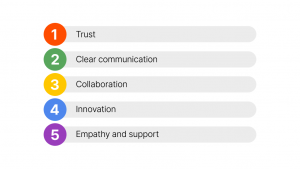
The Top 5 Team Values that Boost Startup Performance
- September 22, 2022
- Productivity , Startups

Tips for Online Students , Tips for Students
The Best Research Skills For Success
Updated: December 8, 2023
Published: January 5, 2020

Every student is required to conduct research in their academic careers at one point or another. A good research paper not only requires a great deal of time, but it also requires complex skills. Research skills include the ability to organize, evaluate, locate, and extract relevant information.
Let’s learn how to develop great research skills for academic success.
What is Research?
We’ve all surely heard the term “research” endlessly. But do you really know what it means?
Research is a type of study that focuses on a specific problem and aims to solve it using scientific methods. Research is a highly systematic process that involves both describing, explaining, and predicting something.

Photo by Startup Stock Photos from Pexels
What are research skills.
Research skills are what helps us answer our most burning questions, and they are what assist us in our solving process from A to Z, including searching, finding, collecting, breaking down, and evaluating the relevant information to the phenomenon at hand.
Research is the basis of everything we know — and without it, we’re not sure where we would be today! For starters, without the internet and without cars, that’s for sure.
Why are Research Skills Important?
Research skills come in handy in pretty much everything we do, and especially so when it comes to the workforce. Employers will want to hire you and compensate you better if you demonstrate a knowledge of research skills that can benefit their company.
From knowing how to write reports, how to notice competition, develop new products, identify customer needs, constantly learn new technologies, and improve the company’s productivity, there’s no doubt that research skills are of utter importance. Research also can save a company a great deal of money by first assessing whether making an investment is really worthwhile for them.
How to Get Research Skills
Now that you’re fully convinced about the importance of research skills, you’re surely going to want to know how to get them. And you’ll be delighted to hear that it’s really not so complicated! There are plenty of simple methods out there to gain research skills such as the internet as the most obvious tool.
Gaining new research skills however is not limited to just the internet. There are tons of books, such as Lab Girl by Hope Jahren, journals, articles, studies, interviews and much, much more out there that can teach you how to best conduct your research.
Utilizing Research Skills
Now that you’ve got all the tools you need to get started, let’s utilize these research skills to the fullest. These skills can be used in more ways than you know. Your research skills can be shown off either in interviews that you’re conducting or even in front of the company you’re hoping to get hired at .
It’s also useful to add your list of research skills to your resume, especially if it’s a research-based job that requires skills such as collecting data or writing research-based reports. Many jobs require critical thinking as well as planning ahead.
Career Paths that Require Research Skills
If you’re wondering which jobs actually require these research skills, they are actually needed in a variety of industries. Some examples of the types of work that require a great deal of research skills include any position related to marketing, science , history, report writing, and even the food industry.

Photo by Abby Chung from Pexels
How students can improve research skills.
Perhaps you know what you have to do, but sometimes, knowing how to do it can be more of a challenge. So how can you as a student improve your research skills ?
1. Define your research according to the assignment
By defining your research and understanding how it relates to the specific field of study, it can give more context to the situation.
2. Break down the assignment
The most difficult part of the research process is actually just getting started. By breaking down your research into realistic and achievable parts, it can help you achieve your goals and stay systematic.
3. Evaluate your sources
While there are endless sources out there, it’s important to always evaluate your sources and make sure that they are reliable, based on a variety of factors such as their accuracy and if they are biased, especially if used for research purposes.
4. Avoid plagiarism
Plagiarism is a major issue when it comes to research, and is often misunderstood by students. IAs a student, it’s important that you understand what plagiarism really means, and if you are unclear, be sure to ask your teachers.
5. Consult and collaborate with a librarian
A librarian is always a good person to have around, especially when it comes to research. Most students don’t seek help from their school librarian, however, this person tends to be someone with a vast amount of knowledge when it comes to research skills and where to look for reliable sources.
6. Use library databases
There are tons of online library resources that don’t require approaching anyone. These databases are generally loaded with useful information that has something for every student’s specific needs.
7. Practice effective reading
It’s highly beneficial to practice effective reading, and there are no shortage of ways to do it. One effective way to improve your research skills it to ask yourself questions using a variety of perspectives, putting yourself in the mind of someone else and trying to see things from their point of view.
There are many critical reading strategies that can be useful, such as making summaries from annotations, and highlighting important passages.
Thesis definition
A thesis is a specific theory or statement that is to be either proved or maintained. Generally, the intentions of a thesis are stated, and then throughout, the conclusions are proven to the reader through research. A thesis is crucial for research because it is the basis of what we are trying to prove, and what guides us through our writing.
What Skills Do You Need To Be A Researcher?
One of the most important skills needed for research is independence, meaning that you are capable of managing your own work and time without someone looking over you.
Critical thinking, problem solving, taking initiative, and overall knowing how to work professionally in front of your peers are all crucial for effectively conducting research .
1. Fact check your sources
Knowing how to evaluate information in your sources and determine whether or not it’s accurate, valid or appropriate for the specific purpose is a first on the list of research skills.
2. Ask the right questions
Having the ability to ask the right questions will get you better search results and more specific answers to narrow down your research and make it more concise.
3. Dig deeper: Analyzing
Don’t just go for the first source you find that seems reliable. Always dig further to broaden your knowledge and make sure your research is as thorough as possible.
4. Give credit
Respect the rights of others and avoid plagiarizing by always properly citing your research sources.
5. Utilize tools
There are endless tools out there, such as useful websites, books, online videos, and even on-campus professionals such as librarians that can help. Use all the many social media networks out there to both gain and share more information for your research.
6. Summarizing
Summarizing plays a huge role in research, and once the data is collected, relevant information needs to be arranged accordingly. Otherwise it can be incredibly overwhelming.
7. Categorizing
Not only does information need to be summarized, but also arranged into categories that can help us organize our thoughts and break down our materials and sources of information.

Photo by Noelle Otto from Pexels
What are different types of research, 1. qualitative.
This type of research is exploratory research and its aim is to obtain a better understanding of reasons for things. Qualitative research helps form an idea without any specific fixed pattern. Some examples include face-to-face interviews or group discussions.
2. Quantitative
Quantitative research is based on numbers and statistics. This type of research uses data to prove facts, and is generally taken from a large group of people.
3. Analytical
Analytical research has to always be done from a neutral point of view, and the researcher is intended to break down all perspectives. This type of research involves collecting information from a wide variety of sources.
4. Persuasive
Persuasive research describes an issue from two different perspectives, going through both the pros and cons of both, and then aims to prove their preference towards one side by exploring a variety of logical facts.
5. Cause & Effect
In this type of research, the cause and effects are first presented, and then a conclusion is made. Cause and effect research is for those who are new in the field of research and is mostly conducted by high school or college students.
6. Experimental Research
Experimental research involves very specific steps that must be followed, starting by conducting an experiment. It is then followed by sharing an experience and providing data about it. This research is concluded with data in a highly detailed manner.
7. Survey Research
Survey research includes conducting a survey by asking participants specific questions, and then analyzing those findings. From that, researchers can then draw a conclusion.
8. Problem-Solution Research
Both students and scholars alike carry out this type of research, and it involves solving problems by analyzing the situation and finding the perfect solution to it.
What it Takes to Become a Researcher
- Critical thinking
Research is most valuable when something new is put on the table. Critical thinking is needed to bring something unique to our knowledge and conduct research successfully.
- Analytical thinking
Analytical thinking is one of the most important research skills and requires a great deal of practice. Such a skill can assist researchers in taking apart and understanding a large amount of important information in a short amount of time.
- Explanation skills
When it comes to research skills, it’s not just about finding information, but also about how you explain it. It’s more than just writing it out, but rather, knowing how to clearly and concisely explain your new ideas.
- Patience is key
Just like with anything in life, patience will always take you far. It might be difficult to come by, but by not rushing things and investing the time needed to conduct research properly, your work is bound for success.
- Time management
Time is the most important asset that we have, and it can never be returned back to us. By learning time management skills , we can utilize our time in the best way possible and make sure to always be productive in our research.
What You Need to Sharpen Your Research Skills
Research is one of the most important tasks that students are given in college, and in many cases, it’s almost half of the academic grade that one is given.
As we’ve seen, there are plenty of things that you’ll need to sharpen your research skills — which mainly include knowing how to choose reliable and relevant sources, and knowing how to take them and make it your own. It’s important to always ask the right questions and dig deeper to make sure that you understood the full picture.
Related Articles
What are research skills?
Last updated
26 April 2023
Reviewed by
Broadly, it includes a range of talents required to:
Find useful information
Perform critical analysis
Form hypotheses
Solve problems
It also includes processes such as time management, communication, and reporting skills to achieve those ends.
Research requires a blend of conceptual and detail-oriented modes of thinking. It tests one's ability to transition between subjective motivations and objective assessments to ensure only correct data fits into a meaningfully useful framework.
As countless fields increasingly rely on data management and analysis, polishing your research skills is an important, near-universal way to improve your potential of getting hired and advancing in your career.
Make research less tedious
Dovetail streamlines research to help you uncover and share actionable insights
What are basic research skills?
Almost any research involves some proportion of the following fundamental skills:
Organization
Decision-making
Investigation and analysis
Creative thinking
What are primary research skills?
The following are some of the most universally important research skills that will help you in a wide range of positions:
Time management — From planning and organization to task prioritization and deadline management, time-management skills are highly in-demand workplace skills.
Problem-solving — Identifying issues, their causes, and key solutions are another essential suite of research skills.
Critical thinking — The ability to make connections between data points with clear reasoning is essential to navigate data and extract what's useful towards the original objective.
Communication — In any collaborative environment, team-building and active listening will help researchers convey findings more effectively through data summarizations and report writing.
What are the most important skills in research?
Detail-oriented procedures are essential to research, which allow researchers and their audience to probe deeper into a subject and make connections they otherwise may have missed with generic overviews.
Maintaining priorities is also essential so that details fit within an overarching strategy. Lastly, decision-making is crucial because that's the only way research is translated into meaningful action.
- Why are research skills important?
Good research skills are crucial to learning more about a subject, then using that knowledge to improve an organization's capabilities. Synthesizing that research and conveying it clearly is also important, as employees seek to share useful insights and inspire effective actions.
Effective research skills are essential for those seeking to:
Analyze their target market
Investigate industry trends
Identify customer needs
Detect obstacles
Find solutions to those obstacles
Develop new products or services
Develop new, adaptive ways to meet demands
Discover more efficient ways of acquiring or using resources
Why do we need research skills?
Businesses and individuals alike need research skills to clarify their role in the marketplace, which of course, requires clarity on the market in which they function in. High-quality research helps people stay better prepared for challenges by identifying key factors involved in their day-to-day operations, along with those that might play a significant role in future goals.
- Benefits of having research skills
Research skills increase the effectiveness of any role that's dependent on information. Both individually and organization-wide, good research simplifies what can otherwise be unwieldy amounts of data. It can help maintain order by organizing information and improving efficiency, both of which set the stage for improved revenue growth.
Those with highly effective research skills can help reveal both:
Opportunities for improvement
Brand-new or previously unseen opportunities
Research skills can then help identify how to best take advantage of available opportunities. With today's increasingly data-driven economy, it will also increase your potential of getting hired and help position organizations as thought leaders in their marketplace.
- Research skills examples
Being necessarily broad, research skills encompass many sub-categories of skillsets required to extrapolate meaning and direction from dense informational resources. Identifying, interpreting, and applying research are several such subcategories—but to be specific, workplaces of almost any type have some need of:
Searching for information
Attention to detail
Taking notes
Problem-solving
Communicating results
Time management
- How to improve your research skills
Whether your research goals are to learn more about a subject or enhance workflows, you can improve research skills with this failsafe, four-step strategy:
Make an outline, and set your intention(s)
Know your sources
Learn to use advanced search techniques
Practice, practice, practice (and don't be afraid to adjust your approach)
These steps could manifest themselves in many ways, but what's most important is that it results in measurable progress toward the original goals that compelled you to research a subject.
- Using research skills at work
Different research skills will be emphasized over others, depending on the nature of your trade. To use research most effectively, concentrate on improving research skills most relevant to your position—or, if working solo, the skills most likely have the strongest impact on your goals.
You might divide the necessary research skills into categories for short, medium, and long-term goals or according to each activity your position requires. That way, when a challenge arises in your workflow, it's clearer which specific research skill requires dedicated attention.
How can I learn research skills?
Learning research skills can be done with a simple three-point framework:
Clarify the objective — Before delving into potentially overwhelming amounts of data, take a moment to define the purpose of your research. If at any point you lose sight of the original objective, take another moment to ask how you could adjust your approach to better fit the original objective.
Scrutinize sources — Cross-reference data with other sources, paying close attention to each author's credentials and motivations.
Organize research — Establish and continually refine a data-organization system that works for you. This could be an index of resources or compiling data under different categories designed for easy access.
Which careers require research skills?
Especially in today's world, most careers require some, if not extensive, research. Developers, marketers, and others dealing in primarily digital properties especially require extensive research skills—but it's just as important in building and manufacturing industries, where research is crucial to construct products correctly and safely.
Engineering, legal, medical, and literally any other specialized field will require excellent research skills. Truly, almost any career path will involve some level of research skills; and even those requiring only minimal research skills will at least require research to find and compare open positions in the first place.
Get started today
Go from raw data to valuable insights with a flexible research platform
Editor’s picks
Last updated: 21 December 2023
Last updated: 16 December 2023
Last updated: 6 October 2023
Last updated: 5 March 2024
Last updated: 25 November 2023
Last updated: 15 February 2024
Last updated: 11 March 2024
Last updated: 12 December 2023
Last updated: 6 March 2024
Last updated: 10 April 2023
Last updated: 20 December 2023
Latest articles
Related topics, log in or sign up.
Get started for free

September 5
0 comments
Boost Your Brainpower: How to Improve Research Skills Like a Pro

By Joshua Turner
September 5, 2023
Research is an essential component of academic and professional life. It involves gathering information, analyzing it, and presenting it in a meaningful way. However, conducting research can be a challenging task. It requires a set of skills that can be improved over time. This article will discuss some tips and strategies for enhancing them.
Understanding the basics is the first step toward improving your capabilities. This includes knowing how to identify reliable sources, conducting effective searches, and evaluating the credibility of information.
You also need to clearly understand the process , including the different stages involved. Mastering these basics can improve your ability to gather and analyze information, which is integral for effective study.
Key Takeaways
- Understanding the basics is vital for improving your skills .
- Conducting effective searches and evaluating the credibility of information is crucial to successful research.
- A clear understanding of the process can improve your ability to gather and analyze information.
Understanding the Basics of Research
Defining research.
Research is a systematic process of collecting and analyzing information to answer a question or solve a problem. It involves identifying a problem, formulating a hypothesis, collecting and analyzing data, and drawing conclusions. It can be conducted in various fields, including science, social sciences, and humanities. It is a critical tool for acquiring knowledge and advancing our understanding of the world around us.
Importance of Research Skills
Developing proficiency in this allows individuals to gather and evaluate information, make decisions, and solve problems effectively. It involves knowing how to identify reliable sources, assess the credibility of information, and synthesize data into meaningful insights. These are particularly important in academic research, where the quality can impact one’s grades, reputation, and career prospects.
The Research Process
Identifying the problem.
The first step is identifying the problem you want to investigate. This involves determining what questions you want to answer or what information you want to gather. You need to be clear and specific about your goals to stay on track throughout the process.
Collecting Data
Once you have identified the problem, the next step is to collect data. This can involve conducting surveys, reviewing literature, or analyzing existing data. Use various sources to ensure you have a comprehensive understanding of the topic.
Analyzing Information
After collecting data, you need to analyze the information you have gathered. This involves looking for patterns, trends, and relationships in the data. You may need statistical analysis or other methods to interpret the data and draw conclusions.
Presenting Findings
The final step is presenting your findings. This can involve creating visual aids such as charts or graphs to help illustrate your results. You also need to be able to clearly explain your findings and how they relate to your research problem.
Improving Information Gathering
Effective use of search engines.
Search engines are a valuable tool for finding information quickly and easily . Start by using specific keywords that accurately reflect what you’re looking for. Use quotation marks to search for exact phrases and the minus sign to exclude certain words. Don’t rely solely on the first few results; dig deeper to find relevant and reliable sources.
Utilizing Library Resources
Libraries offer a wealth of resources beyond just books. Take advantage of databases and other online resources provided by your library. These resources often provide access to peer-reviewed articles and other reliable sources that may not be available through a simple internet search. Ask a librarian for help if you need help figuring out where to start.
Evaluating Information Sources
Not all information sources are created equal. Consider the author’s credentials, publication date, and publisher when evaluating sources. Look for sources that are peer-reviewed or come from reputable organizations. Be wary of references that seem biased or contain false information. Use critical thinking to evaluate the information you find and determine its reliability.
Enhancing Critical Thinking and Analytical Skills
Understanding bias.
To enhance critical thinking and analytical abilities, understand the impact of bias . Everyone has preferences, and it is necessary to recognize them to avoid making assumptions. To overcome bias, question assumptions, challenge stereotypes, and seek diverse perspectives.
Observation and Inquiry
Observation and inquiry are critical to developing analytical proficiency. Observing carefully and asking questions can help identify patterns and relationships that might not be immediately apparent. Be curious, ask questions, and seek out information to develop a deeper understanding of a topic.
Practice and Creativity
Engage in activities that challenge your thinking and encourage creativity , such as brainstorming, problem-solving, and analyzing complex data. Engaging in these activities regularly can help develop and refine your analytical abilities.
Effective Writing and Communication
Drafting an outline.
Before starting any project, clearly understand what you want to achieve and the direction you want to take. Drafting an outline is an excellent way to organize your thoughts and ideas.
It helps you create a roadmap, ensuring you stay on track and take all critical points. An outline should include the main points you want to cover, sub-points, and supporting evidence.
Report and Blog Post Writing
When writing a report or a blog post, keeping your audience in mind is vital. Your writing should be clear, concise, and easy to understand. Use simple language and avoid jargon that your readers may need help understanding. Use headings, bullet points, and tables to break up your text and make it easier to read. Always proofread your work before publishing to ensure that it is error-free.
Avoiding Plagiarism
Plagiarism is a serious offense that can have severe consequences. Always cite your sources correctly and give credit where credit is due. Use quotation marks when using someone else’s words, and include a citation.
When paraphrasing, reword the text in your own words and include a citation. Use plagiarism checkers to ensure that your work is original and free from plagiarism.
Time Management and Organization
Prioritizing tasks.
One of the skills for improving it is prioritizing tasks effectively. Start by creating a list of all the tasks you need to complete, and then rank them in order of importance.
Use a tool like a to-do list or a project management app to keep track of your priorities and deadlines. This will help you focus on and complete the most critical tasks on time.
Meeting Deadlines
To ensure you meet your deadlines, create a schedule with specific deadlines for each task. Use a calendar or reminder app to keep track of your deadlines and set reminders for yourself.
Break down large tasks into smaller, more manageable ones, and set deadlines for each subtask. This will help you stay on track and avoid last-minute rushes.
Multitasking
Multitasking can effectively improve your competence, but it can also be a trap. To multitask effectively, group similar tasks together and focus on one task at a time. Avoid switching between tasks too frequently, as this can lead to decreased productivity and increased stress. Use tools like timers or Pomodoro apps to help you stay focused and avoid distractions.
Adapting and Improving Research Skills
Continuous learning.
Staying up-to-date with the latest methodologies, tools, and techniques is vital. One way to do this is by attending workshops, conferences, and webinars. Another way is to read papers and articles regularly. Doing this lets you learn new strategies and techniques to help you in your work .
Adapting to New Research Strategies
The field is constantly evolving, and new strategies are being developed all the time. Adapt to these new strategies as they emerge.
One way to do this is by collaborating with other researchers using these new strategies. Another way is to experiment with new techniques yourself. Doing this lets you learn which strategies work best for your research and adapt accordingly.
Frequently Asked Questions
How do students develop research skills.
They can be developed by practicing critical thinking , reading widely, and learning to evaluate sources. Students can also benefit from taking courses in methods and participating in projects.
How can I improve my online research skills?
Students can start by using advanced search techniques, such as Boolean operators and quotation marks. They should also learn to evaluate online sources for credibility, accuracy, and bias. Finally, students can use tools like citation managers to keep track of their references.
What skills do you need to succeed in research?
Students need various skills, including critical thinking, problem-solving, communication, and time management . They should also be able to work independently, collaborate effectively, and adapt to new technologies and methods.
How do you develop research skills in critical thinking?
Students should learn to ask questions, analyze evidence, and evaluate arguments. They can also benefit from practicing different types of research, such as empirical, theoretical, and applied research.
What are some research tips for students?
Some tips include starting early, creating a plan , using various sources, taking notes, and citing sources properly. Students should also be prepared to revise their questions and methods as needed.
Why are research skills important for students?
They are vital because they help them to become critical thinkers, problem-solvers, and lifelong learners. These are also necessary for success in many careers , including academia, business, and government.
You might also like
The Ultimate Guide: What Is the Best Definition of Sobriety?
Psychoanalysis vs. behavior therapy: what’s the difference, unlocking the power of music: how it shapes your behavior, stop guessing here’s which phase of strategic conflict management you can ignore.

How To Improve Research Accuracy: Evaluating Sources And Articles
In the pursuit of scholarly excellence, improving research accuracy is paramount. This article guides you through evaluating sources, verifying facts, and ensuring the integrity of your findings.
Researchers, scholars, and students alike can benefit from these methods to enhance the precision, reliability, and validity of their work.
From peer-reviewed journals to rigorous data collection, each step is a critical component in the journey towards producing research that is not only accurate but also impactful and credible.
How To Check For Research Accuracy
Check the article source and peer review status.
When you come across a study, examining where it’s published can be quite revealing. Scholarly journals with a peer-review process are generally considered credible.
This process involves other experts in the field evaluating the research before publication, ensuring the findings are valid, reliable, and free from obvious errors or biases.
For instance, imagine a groundbreaking study on climate change. If this study is published in a well-known, peer-reviewed journal, it has likely undergone rigorous scrutiny. This scrutiny involves:
- Checking the research methods,
- Statistical analysis, and
- The overall integrity of the findings.
Such a publication process significantly reduces the likelihood of inaccuracies or misleading conclusions.
Additionally, peer-reviewed articles often cite other reliable sources, further enhancing their credibility. You can use libguides or specific academic databases to find these sources and verify the research’s foundation.
This level of scrutiny is essential because even small errors in data collection or interpretation can lead to significantly different conclusions.
Examine the Research Method
The methodology section reveals how the researchers conducted their study – it’s the blueprint of their investigation. This section’s transparency and detail are key indicators of the research’s reliability.
Take, for example, a study on dietary habits conducted by a researcher from a State University. If the methodology section clearly outlines the data collection process, such as:
- Participant selection,
- Instruments used for gathering data, and
- The statistical methods for analyzing it
you gain insight into how the researchers arrived at their conclusions. This detail is a hallmark of a well-conducted study.

A rigorous methodology also reduces the chance of bias and error. By examining whether the research methods are appropriate for the study’s goals and if they are applied consistently, you can better judge the study’s validity.
For instance, in qualitative research, the way researchers interpret participant observations can significantly influence the findings. A method that is transparent and well-defined suggests that the researchers have taken steps to minimize personal biases and ensure accurate results.
Analyze the Data and Conclusions
The heart of any research lies in its data and the conclusions drawn from it. Evaluate the data sources and the statistical methods used. Are the methods appropriate for the type of research? Do the conclusions logically follow from the data?
For example, in a study published by a scholar, the use of statistical analysis to interpret data is a key factor in determining the study’s reliability.

If the statistical methods are valid and the interpretation of data is unbiased and well-reasoned, you can place more trust in the research findings.
Also, look at how the authors discuss their findings in relation to other studies. A valuable research article will not only present its findings but also place them in the context of existing research, acknowledging any discrepancies or agreements with previous work.
In essence, evaluating academic research requires a combination of critical thinking and a keen eye for detail. You need to examine the source, scrutinise the methodology, and critically assess the data and conclusions.
This approach ensures that the research you rely on is not just informative but also accurate and of the highest quality.
Wrapping Up: Tips To Check & Finding Accurate Research
Enhancing research accuracy is a meticulous journey requiring diligence in source evaluation, methodology scrutiny, and data interpretation.
By rigorously applying these principles, researchers can significantly reduce errors and biases, yielding more reliable and valid findings.
Remember, the credibility of your research is not just in its conclusions, but in the transparent and careful process of its formation.

Dr Andrew Stapleton has a Masters and PhD in Chemistry from the UK and Australia. He has many years of research experience and has worked as a Postdoctoral Fellow and Associate at a number of Universities. Although having secured funding for his own research, he left academia to help others with his YouTube channel all about the inner workings of academia and how to make it work for you.
Thank you for visiting Academia Insider.
We are here to help you navigate Academia as painlessly as possible. We are supported by our readers and by visiting you are helping us earn a small amount through ads and affiliate revenue - Thank you!

2024 © Academia Insider
- Resources Home 🏠
- Try SciSpace Copilot
- Search research papers
- Add Copilot Extension
- Try AI Detector
- Try Paraphraser
- Try Citation Generator
- April Papers
- June Papers
- July Papers

How to become good at academic research writing?

11 ways you can get better at communicating your research
As researchers, we spend years of our life building our research. But then when it comes to academic research writing, many of us still struggle. Writing your research effectively is one of the critical steps in getting your paper accepted .
Research communication is more than aggregating results and ideas in one place. A good research paper is one which is easy to consume with all hypotheses validated. The readers should be able to take away concepts from your research that they can further build on.
At SciSpace (Formerly Typeset), we talk to researchers and publishers every day in our journey to build the easiest and simplest academic research writing platform . Based on our conversations, we see that researchers use a number of strategies to become good at academic research writing.
Writing better academic papers has two parts to it.
- The writing process
- Different aspects of communicating research

Breaking mental barriers to writing
1. Daily Practice : From Hemingway to new age authors, there is an age old advice that still works — writing 1000 words a day. When you start writing, do not worry about publishing. Just write everything you know about your topic of research. This allows your brain to get comfortable with the writing process. With practice, you will find better ways to express your ideas and concepts.
2. Initial Resistance : You will get uncomfortable. You will face resistance. But some of the best words will flow out of your hands and minds when you fight it out. When you keep at it, when you sit with a piece of paper until you can write something satisfying — that’s when the magic happens.
3. The Struggle : Your struggle should show up in your work. Your pain should transcend yourself and become the words you write. First thing you write for the day will always be difficult — even when you have written a lot. Do not get bogged down by it.
4. Read a lot: Most of the good writers are good readers. But be wary of mimicking any specific writing style. Focus on your own Voice.
5. Writing as a way to think : In this amazing talk , Simon Peyton Jones from Microsoft Research explains how writing can “quick start” your thought process on your research. And the more you write the more quality content you produce. Only regular practice will help you produce good content.

Becoming good at academic research writing
1. Collect as many references as possible in your research area. And read them all. Yes, it may sound like the best academic writers have a shortcut, but they don’t. The more you read academic papers, the better you become in assimilating and understanding the knowledge in your domain. And you will get better in citing the right sources for your research — an important part of building effective arguments in your paper.
2. Use your academic research writing process more as a thinking tool . Understand your area of research better by writing about it in multiple ways. Find different ways of communicating the same concept. Have your written a 3 paragraph abstract? Can you write it in a single paragraph? Can you write it in two sentences and still be clear? Being concise and clear is a skill. And you acquire it by practice.
3. Do a review of the best papers in your domain. Write a one-page summary of the best papers in your domain. Can you understand their theme, main construct, the supporting argument and evidence? If you are in the initial stages of your academic writing journey, you might find difficulty in comprehending research done by others. If at any point you are stuck and not sure whom to seek help in understanding it, few tools might help you solve the problem. In order to understand other research papers and the major arguments put forth in them, you can use SciSpace Copilot , which is an AI research assistant that can help you get simplified meaning to the parts of any research paper you don't understand by highlighting them. Once you completely understand the work, try to present it all in one page! Better post them in your blog. Get used to publishing what you write. You will have lesser resistance to writing and publishing this way.
4. Share your paper with your friends, reviewers, whomever is ready — ask them what they understood. Is the idea clear? Is the solution clear? Is there a correlation between the two? What parts are found easy to read and what parts are difficult? Feedback is the best way to improve on your writing .
5. Write like you talk. Try explaining your paper to people orally. Record it. See what words people find easy to understand. And then use a similar narration style in your content. The more you explain to people, the better you become in communicating your ideas. Writing like talking has become the biggest trend in business writing , recently. So why not in academic writing?
6. Weed out unwanted parts of your research process using good tools. For example, use Mendeley to discover and collect all your references. So when you are ready to write your paper you can quickly get all your sources in a click. For following author guidelines, use SciSpace - it automatically applies all the formatting rules on your content in a click.
In case you want to get started with your research paper immediately, try the fastest academic research writing platform . You can learn more about what we do and how we help you in your academic research writing here .
We invite you to consider SciSpace as a solution to simplify your research workflows. With this comprehensive end-to-end solution, discovering, writing, and collaborating on research papers becomes much easier.

This scholarly management tool offers integrated writing tools, copyright detection technology, streamlined profile management, and search-friendly indexing that will allow you to display and manage your output seamlessly.
For further reading
- What are some good tips and strategies for writing an academic paper?
- What are useful tools for writing academic research
- How to write a great academic research paper
- Seven Tips From Ernest Hemingway on How to Write Fiction
- Elsevier.com — Infographic on how to write research
- Top reasons for research paper rejection
- How to increase citation count of your academic research
You might also like

Consensus GPT vs. SciSpace GPT: Choose the Best GPT for Research

Literature Review and Theoretical Framework: Understanding the Differences

Types of Essays in Academic Writing - Quick Guide (2024)
Articles Hub | Return to Main page

Student Success
How to improve your critical thinking and research skills.
Critical thinking doesn’t always come naturally to us. It requires analyzing the facts, gathering as much information as possible, thinking open-mindedly, and then forming a judgment.
Rest assured, you can teach yourself to think critically. Here are tips to help you get started.
Be aware of authors’ motivations
You can evaluate an author’s work if you’re aware of what drove that person to undertake the research and writing in the first place. Here are things to be aware of:
- Avoid personal feelings
- Be wary of phrases like always , a lot , or never unless you can attach a number to confirm the characterization
- Steer clear of first-person (using “I”) and second-person (using “you”) pronouns unless you’re asked to reflect or give advice
- Find credible sources ( more on this below!)
- Read multiple articles from different perspectives
Find credible evidence
A rule of thumb for most writing is to make a claim, provide evidence to support the claim, and then use reasoning to tie it all together. How do you analyze your sources? Use critical thinking skills. Ask questions such as:
- Did the researchers only study 10 people?
- Is the writer representing a particular company or industry?
- What other articles and studies has the writer published?
- Is this article published in a scholarly journal, or on a website selling something?
Research well
It’s easier to find credible evidence when you’re looking in the right places. Here are key tips for researching well:
- Use your school’s online library to find scholarly articles. Peer-reviewed articles have been reviewed by other professionals or scholars in the field and are generally the most accurate.
- When you read something compelling, check out the reference page at the end of that article, and look up some of those sources.
- When an author cites another source, try to find that original source, and read it for yourself.
- Beware of bias, and consider the credibility of the authors you read.
- Pay close attention to dates. If the research was completed more than five to ten years ago, it’s probably outdated.
Make the most of your findings
The key to using evidence in your paper is not just to sprinkle quotes throughout, but rather to integrate the research into your argument. Explain the significance and implications of that research. It’s one thing to write, “Carrots are good for you,” but it’s much more compelling to explain how and why carrots are good for you based on statistics and research. To demonstrate real critical thinking skills, synthesize what you read (citing it accurately), and incorporate it into your argument, paying special attention to the flow and structure. Read how other authors use information to gain your trust, and utilize their strategies to do the same for your reader.
Critical thinking leads to better research skills, which in turn lead to better writing. When you find credible evidence, it will support your claims more effectively, and you’ll learn to read and listen to information with a critical eye for bias and persuasion. As an added bonus, you’ll also learn to be a better conversationalist outside of school.
To get more insights into sharpening your critical thinking and research skills, watch our webinar:

Proudly Serving
Data Protection Statement | Privacy Policy | CA Privacy Notice | Terms of Use
©2024 Tutor.com / The Princeton Review. Not Affiliated with Princeton University
Tutor.com is controlled by Primavera Holdings Limited, a firm owned by Chinese nationals with a principal place of business in Hong Kong, China.

Advice for Students: 10 Steps Towards Better Research

Most schoolwork involves researching on given topics, especially when handed an assignment. The problem is most students do not know how to carry out the research in the right way.
Carrying out research gives you a chance to apply new ideas and thoughts through testing them. It opens doors for the discovery of new advancements that are of great impact to life. Doing this right is crucial in ensuring your work is excellent and following the ten steps below will lead you to it.
1. Plan how you will conduct the research

A good plan equals the accomplishment of a project in time for submission or execution. It motivates you to push on for it to end in the rightful way.
Begin by setting the date of starting the research, then lay down micro-activities alongside the days needed to carry them out before finalizing on the completion day. Do not forget to include a period of reviewing your work after finishing it.
2. Use online resources to research
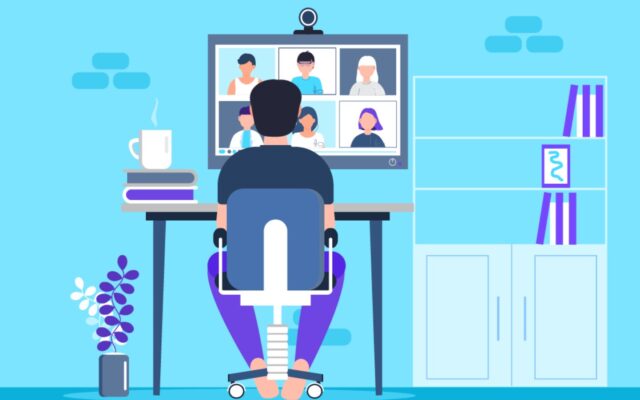
Online sources of information accumulate data into a simple form that will enable you to understand. Choosing the right online sources is crucial in ensuring your work is credible and can earn you good points in case of a project.
These platforms give a detailed explanation of points and include other points of reference to help in conducting further investigation. Avoid sticking to one source but vary your options to enable you to expound on the research.
Although these tricks work well every time if you face a mental block, it is better to contact the professional writers at Edubirdie . You get quality research ideas from there and if needed, they can handle the entire thesis or dissertation for you,
3. Expound on other authors to get information

One of the most crucial parts when conducting research is identifying a book from which you will get most of the information. Books are more reliable since they have gone through reviews by publishing companies before entering the market.
After identifying it, look up for other authors mentioned in the bibliography section to help in doing more research. Pick on those who have recognizable work and be sure to have a couple of sources to start
4. Work with a thesis

Before beginning your work, come up with a question to act as a point of reference whenever you come across a source of information. Ask yourself if the book or online material can lead you to an answer to the set question.
This saves on time as you will get to identify and set aside irrelevant material and stick to the few beneficial ones. At least have two main sources and five should be the most to stay aligned to your work.
5. Handle every piece independently

After rightfully arranging your work and distributing different tasks at a time, the need to execute them is high.
Do this to avoid confusion of mixing up information and ending up with scanty work. Handle every piece with uttermost concern by digging deep and trying to find out the whys and what is that build it up.
6. Organize your work into a system

When carrying out research, the need to use a working system is essential to ensure you have a background checkup. Opting for an organized set of ways is a good start.
You can decide to write down on a notebook the entire research process, right from what you started with and the source and page referred. Typing your activities on a computer is also a great option because the saved information can resurface in the future.
7. Stick to your sources

Sticking to the same sources of information requires you to know how to access them. Keep in mind that you can do this work at school, in the library, or at home, and in rare cases as you stroll.
Identify where to access information from school, such as from a lecturer, in the library from the periodical section, and at home using online sources . It gives you quick access to an increase in findings from wherever you are.
8. Seek help when need be

You have the relevant sources of information and have identified the quickest way to access them but end up needing help. This is the time to reach out to someone to open your eyes to see the bigger picture.
This can be the professor with their door open for inquiries at specific times. The librarian who can give you advice on the books to read or a friend.
9. Take note of new ideas everywhere you go
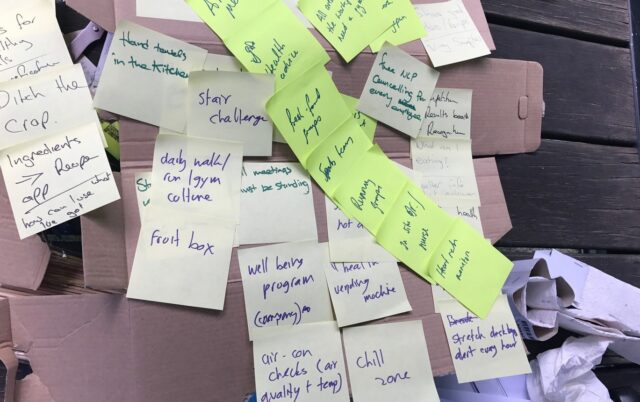
Carrying out research is like having a problem that needs a solution. From the onset of the journey, your mind always perceives the issue, defining and explaining them, and recording the findings.
This can occur anywhere and you need to be set to put them down. Have sticky notes on the wall or mirror, carry a notebook and a pen, or have bathroom markers.
10. Use updated information

The use of current information is important in ensuring that the research assists someone experiencing a current problem. Opposed to using old books and online publications from ten years ago that do not feature current problems and their solutions. Get to dig deep into discovering homepages of online sources to contact them for clarification.
The journey of doing research is an easy way as long as you follow the right steps and ensure the organization. Finding credible sources of information is the primary step to success. Ensure using certified online platforms listed by your professor or institution’s library to help avoid waste of time and resources. Do not underestimate the power of library books and always feel free to reach out for help.
RELATED ARTICLES MORE FROM AUTHOR

Water Resources Engineering Coursework – The Art of Writing Engaging Papers

Innovations in Procurement for Higher Education Institutions: Shaping Tomorrow’s Campus

The Inventor’s Mindset: Demystifying How to Come Up with Great Ideas

How Long Does It Take to Write a 3-Page Paper?

Charting Your Course: A Guide to a Rewarding Career as a Nurse

8 Powerful Study Tech Tools Every Student Needs

EVEN MORE NEWS

Top 6 Games That Turn You Into a Master Strategist

Navigating the Future: How Technology Transforms the Cruise Experience

How to Spring Clean a Kitchen – the Ultimate Checklist?
Popular category.
- Releases 1730
- Features 431
- Previews 416
- Free Downloads 400
- Business 360
Privacy Policy - Terms and Conditions

How to Improve Research Skills?

Table of Contents
Master the Art of Research: 6 Effective Strategies to Improve Your Skills
Research skills are crucial to professional success, and they can greatly benefit your resume. However, it’s not always easy to know where to start with improving these abilities. That’s why we’ve compiled six effective strategies to help you master the art of research.
Why Research Skills Matter and How to Develop Them
Research skills are vital for success in any career that requires critical thinking and problem-solving. The ability to locate and analyze information effectively can help employees make informed decisions, solve complex problems, and develop innovative solutions.
Developing research skills involves more than just conducting a simple Google search. It requires a combination of analytical, organizational, and time-management skills. Here are some practical tips to develop research skills effectively:
- Define your research question: Start by identifying your research question or what you want to know. This helps to narrow your focus and save time.
- Identify credible sources: Look for credible sources that provide reliable information. These could include academic journals, government publications, or reputable websites.
- Read critically: Don’t just skim through the text; read carefully, analyze the arguments presented, and evaluate the evidence.
- Organize your findings: Keep your research organized by using tools such as notetaking apps or spreadsheets. This can help prevent information overload and ensure you have all the necessary information at hand.
- Practice time management: Research can be a time-consuming process, so it’s essential to manage your time effectively. Set realistic deadlines, prioritize tasks, and avoid procrastination.
- Collaborate with others: Collaboration with colleagues or subject matter experts can help broaden your knowledge and provide different perspectives on the subject matter.
By implementing these strategies, you can improve your research skills and become more efficient and effective in your work. Additionally, highlighting your research skills on your resume can help you stand out to potential employers and showcase your abilities.
Teaching Research Skills to Elementary Students: Tips and Strategies
Developing research skills in elementary students helps to lay a foundation for academic success and lifelong learning. Here are some tips and strategies to teach research skills to your young learners:
- Introduce age-appropriate research concepts: Start by explaining the concept of research in simple language that your students can understand. This can include discussing the purpose of research, how to conduct research, and the importance of verifying information.
- Engage your students: Encourage curiosity by creating a research question or topic that your students are interested in. Engage them in hands-on activities that involve exploring different sources of information, such as books, articles, and websites.
- Teach them how to navigate and evaluate sources: Teach your students how to navigate different sources of information, including books, articles, and websites. Show them how to evaluate the credibility of sources by examining the author, date, and publisher.
- Encourage note-taking: Teach your students how to take effective notes by highlighting key points and recording important information in their own words. This helps to develop their critical thinking skills and ensures they understand the information they are researching.
- Teach them how to cite their sources: Introduce your students to basic citation rules and teach them how to properly credit the sources they use in their research.
- Provide feedback: Offer constructive feedback to your students on their research skills and projects. This helps them to identify areas of strength and areas for improvement.
By implementing these tips and strategies, you can help to develop the research skills of your elementary students and set them up for academic success.
Enhancing Research Writing Skills in Quantitative Research
While research skills encompass a broad range of abilities, one critical aspect is the ability to communicate findings effectively through writing. This is especially important in quantitative research, which often involves complex data analysis and interpretation.
To improve research writing skills in quantitative research, consider the following tips:
- Practice summarizing key points: In quantitative research, it’s essential to be able to distill complex data into concise, meaningful insights. Practice summarizing key findings and observations in a single sentence or paragraph, without losing the main points.
- Utilize clear and concise language: Avoid using technical jargon or convoluted phrasing in your writing. Instead, use clear and concise language that is easy for your intended audience to understand.
- Simplify complex data: When presenting complex data, use tables, charts, and graphs to simplify the information. This not only makes it easier to understand but also makes your writing more visually appealing.
- Proofread and edit: Always take the time to proofread and edit your writing carefully. Look for grammatical errors, typos, and inconsistencies, and make sure that your writing is logically structured and easy to follow.
By implementing these tips, you can enhance your research writing skills and effectively communicate your findings in quantitative research.
The Link Between Research and Critical Thinking Skills
Research and critical thinking skills are closely interconnected. Engaging in research activities such as reading articles, analyzing data, and drawing conclusions requires individuals to think critically and logically.
Research allows individuals to gather information and develop a deeper understanding of a topic. As they evaluate sources, assess arguments, and analyze data, they build their ability to think critically. Research also requires individuals to identify gaps in knowledge, ask questions, and seek out additional information, which helps to further develop their critical thinking skills.
Engaging in research can also hone an individual’s problem-solving abilities. In order to conduct research effectively, individuals must be able to break down complex issues into smaller components, identify potential solutions, and evaluate the pros and cons of each option.
Additionally, researching requires individuals to be open-minded and objective. It requires them to approach a topic without bias and to evaluate evidence objectively. This cultivates a deeper understanding of the topic at hand and strengthens critical thinking skills.
In summary, research and critical thinking skills are closely intertwined. Engaging in research activities can enhance an individual’s critical thinking abilities and help them to develop problem-solving skills and an objective mindset.
Demonstrating Research Skills on Your Resume
When it comes to showcasing your research skills on your resume, there are a few things to keep in mind. First, make sure you list your research abilities clearly and concisely. Use a bullet point format to make them stand out.
One effective way to showcase your research skills is by providing examples of your work. If you have conducted research projects in the past, mention them on your resume and provide a brief summary of the methodology and findings. This will demonstrate your research abilities in action.
Another way to demonstrate your research skills is by highlighting your proficiency in relevant research tools and software. For example, if you are skilled in using statistical analysis software, such as SPSS or SAS, make sure you mention it on your resume.
Using action verbs can also help you showcase your research skills. Words like “investigated,” “analyzed,” and “evaluated” can demonstrate that you have experience conducting research and effectively communicating your findings.
Remember to tailor your resume to the specific position and highlight the research skills that are most relevant to the job. By following these tips, you can effectively showcase your research skills to potential employers and stand out in the job market.
Improving Research Skills for Students: Tips and Strategies
Research skills are essential for students at all levels, from elementary school to graduate programs. Developing strong research abilities can not only help students succeed academically but also prepare them for their future careers. Here are some practical tips and strategies for students to improve their research skills:
- Plan ahead: Effective research requires careful planning. Start by identifying the scope of your research project and breaking it down into manageable tasks. Create a timeline for completing each task, taking into account any deadlines or other commitments.
- Use credible sources: When conducting research, it’s important to use reliable sources. Look for information from reputable websites, academic journals, and other trustworthy sources. Avoid relying on information from biased or unreliable sources.
- Take good notes: As you conduct research, be sure to take thorough and accurate notes. Keep track of your sources, including the author, title, and publication date. Make note of any key ideas or quotes that you might want to use later in your project.
- Organize your research: Once you’ve gathered all of your research material, it’s important to organize it in a way that makes sense to you. Create an outline or use a mind-mapping tool to help you see how all the different pieces of information fit together.
- Practice time management: Research projects can be time-consuming, so it’s important to manage your time effectively. Break your project down into smaller tasks and allocate specific amounts of time to each one. Try to work on your research project for a set amount of time each day or week.
- Take advantage of resources: There are many resources available to help students improve their research skills. Check with your school or local library to see what resources they offer, such as workshops or online tutorials. Ask your professors or librarians for advice on conducting research in your field of study.
By implementing these strategies, students can develop strong research skills that will serve them well throughout their academic and professional careers.
Learning Research Skills Online: Platforms and Resources
Thanks to the internet, learning and improving research skills can be done from anywhere with online courses and resources available for free or at minimal cost. Here are some of the top platforms and resources to check out:
Coursera is a popular platform that offers online courses from top universities and institutions. They have a variety of courses related to research skills, including academic writing, research methods, and data analysis. Most courses are self-paced, allowing learners to set their own schedule and progress through the material at their own pace.
edX is another popular platform that offers courses from top universities and institutions. They have a variety of courses related to research skills, including critical thinking, research ethics, and data analysis. Most courses are self-paced, allowing learners to set their own schedule and progress through the material at their own pace.
Google Scholar
Google Scholar is a search engine that specializes in peer-reviewed articles, theses, books, and other academic sources. It’s a great resource for finding high-quality sources for research projects and staying up-to-date on current research in your field.
Research Methods Knowledge Base
The Research Methods Knowledge Base is a comprehensive textbook that covers a wide range of research methods, from quantitative to qualitative approaches. It’s a valuable resource for anyone looking to improve their research skills, whether you’re a student or a professional.
Udemy is an online learning platform that offers a wide range of courses, including research skills. They have courses on topics such as research writing, data analysis, and research methods. Most courses offer lifetime access to the material, allowing learners to revisit the content at any time.
ResearchGate
ResearchGate is a social networking site that connects researchers from around the world. It’s a great platform to share and discover research, ask for advice from other researchers, and connect with potential collaborators. It’s also a great way to stay up-to-date on current research in your field.
With so many resources available online, it’s never been easier to learn and improve research skills. Whether you’re a student or a professional, taking advantage of these resources can help you stay ahead in your field and achieve your research goals.
Frequently Asked Questions about Research Skills
Research skills are essential for success in many fields, and it’s important to have a good understanding of how they can be developed and improved. Below are some common questions that people often have about research skills.
How can I teach research skills to my students?
There are many ways to teach research skills to students, and the most effective techniques will depend on the age and skill level of your students. In general, it’s important to start by emphasizing the importance of research and showing them how to use different types of sources to find information. You can also provide guidance on note-taking, outlining, and other strategies that can help them organize their research effectively.
What are some good resources for learning research skills?
There are many great online resources available for people who want to improve their research skills. Some good options include online courses, instructional videos, and research guides from reputable universities and academic institutions. It’s also a good idea to look for books and other resources that are specifically geared toward the type of research you’re interested in.
How can I improve my research skills online?
There are many ways to improve your research skills online, including taking online courses, participating in forums and discussion groups, and using online databases and search engines to find information. It’s also a good idea to stay up-to-date on the latest research tools and techniques by reading blogs and articles from reputable sources.
How can I improve my research skills as a professional?
If you’re looking to improve your research skills as a professional, there are several steps you can take. Start by setting specific research goals and identifying areas where you need to improve. You can also attend conferences and training sessions to learn from experts in your field, and seek feedback from colleagues and mentors to help identify areas for improvement.
How can research skills help me in my career?
Research skills are essential in many different fields, and can provide a significant advantage for professionals who know how to use them effectively. By developing strong research skills, you can improve the quality of your work, identify new opportunities for growth and innovation, and demonstrate your expertise and credibility to clients and colleagues.
What are some common mistakes to avoid when conducting research?
Some common mistakes to avoid when conducting research include failing to define your research question clearly, relying too heavily on a single source or piece of data, and failing to consider alternative explanations for your findings. It’s also important to be aware of potential sources of bias, and to take steps to minimize their impact on your research.

eSoft Management Consultants, a team of seasoned professionals with vast expertise in business strategy, operations, leadership, and management, are devoted to empowering businesses to evolve and thrive. Their well-researched, meticulous content offers invaluable insights on management principles, leadership styles, and industry trends. Upholding strict editorial guidelines, they ensure accurate, relevant, and timely knowledge dissemination. As trusted advisors, they not only provide insights but also act as partners in growth, helping organizations unlock their full potential through strategic understanding and action.
View all posts
Similar Posts

Understanding Type 1: The Reformer Personality
Welcome to our series on the Enneagram system, a powerful tool for self-improvement and self-awareness. In this article, we’ll delve into Type One: The Reformer, one of the nine distinct personality types identified by the Enneagram. Type One, also known as The Reformer, is characterized by a strong sense of right and wrong and a…

Top Skills Needed In The Age Of AI: What To Learn And Master
The age of AI is transforming our world in ways we’ve never experienced before, redefining the skill set necessary to thrive in this dynamic landscape. While technical abilities such as AI literacy and data fluency remain essential, this new era also emphasizes uniquely human skills and hybrid abilities that couple human ingenuity with technological fluency….

Remote Project Management: Tools and Tactics for Success
In today's dynamic business landscape, the rise of remote work has necessitated a shift in the way projects are managed. Remote project management brings with it a unique set of challenges and opportunities that require a strategic approach. As organizations increasingly embrace the flexibility and efficiency of remote teams, the need for effective tools and…

Data Protection and GDPR: Safeguarding Client Information in the Digital Age
In today's digital world, the protection of client information has become a critical concern for businesses across all industries. With the implementation of the General Data Protection Regulation (GDPR), organizations are now required to adhere to strict guidelines for safeguarding personal data. This has prompted a paradigm shift in the way companies handle, store, and…

Cyber Hygiene: Strengthening Your Digital Defense
In today’s digital age, it is crucial to prioritize your cybersecurity and protect yourself from the ever-evolving threats of the online world. Mastering cyber hygiene is essential for strengthening your digital defense and safeguarding your personal information. By implementing best practices and following a few simple guidelines, you can significantly reduce the risk of falling…

Group Dynamics
Group dynamics encompasses the interactions and relationships among members of a group. Understanding group dynamics is essential in various contexts, including workplaces, educational settings, and social groups. It involves analyzing how individuals behave within a group, the impact of communication patterns, leadership dynamics, and the distribution of roles and responsibilities. Additionally, effective conflict resolution, trust-building,…
10 Fact Finding Skills and How to Develop Them

- Updated December 25, 2023
- Published August 12, 2023
Are you looking to learn more about Fact Finding skills? In this article, we discuss Fact Finding skills in more detail and give you tips about how you can develop and improve them.
What are Fact Finding Skills?
Fact-finding skills refer to the ability to gather accurate and relevant information from various sources in order to make informed decisions, solve problems, or develop a comprehensive understanding of a particular subject or situation. These skills are crucial in many aspects of life, including academic, professional, and personal contexts. Fact-finding skills involve several key components:
Research Skills
- Critical Thinking
Interviewing Skills
Information evaluation, documentation, synthesis and analysis, communication skills.
- Adaptability
Verification Techniques
Ethical considerations.
Fact-finding skills are particularly important in fields such as journalism, law, scientific research, business analysis, policy-making, and academic studies. In today’s digital age, where vast amounts of information are readily available, honing these skills is essential to discerning accurate and reliable information from misinformation or fake news.
Top 10 Fact Finding Skills
Below we discuss the top 10 Fact Finding skills. Each skill is discussed in more detail, and we will also give you tips on how you can improve them.
Research skills are like your compass in the vast landscape of information, guiding you to credible sources and helping you unearth the hidden gems of knowledge. They encompass a range of abilities that enable you to uncover relevant and accurate information while navigating through the sea of data.
These skills include knowing how to formulate effective research questions, utilizing various search engines and databases, and mastering the art of refining your search queries. Moreover, being able to evaluate sources for credibility and relevance critically is essential. You’ll need to discern between scholarly articles, reputable websites, and potentially biased sources. It’s not just about finding information; it’s about finding the right information.
How to Improve Research Skills
Improving research skills is a journey that involves both technique and practice. One concrete way to enhance these skills is by learning advanced search operators. For example, on search engines, using quotation marks (” “) around a phrase will help you find exact matches. Additionally, learning to use Boolean operators (AND, OR, NOT) can help you refine your searches.
Another effective method is to practice source evaluation. Compare information from different sources on the same topic and analyze their credibility and bias. Lastly, consider exploring your library’s databases and resources. Libraries often provide workshops on research skills and access to academic databases that can significantly enrich your research endeavors. Remember, the more you practice, the more confident and skilled you’ll become in navigating the sea of information effectively.
Related : 10 Research Skills and How To Develop Them
Critical thinking is the art of looking beyond the surface, of questioning and dissecting information to understand its essence truly. It’s about being a detective of ideas, uncovering biases, assumptions, and implications that might not be immediately apparent. With critical thinking, you don’t just accept information at face value – you actively engage with it, scrutinize it, and form well-informed judgments.
These skills encompass various techniques, such as analyzing arguments, identifying logical fallacies, and recognizing patterns and inconsistencies. It’s about understanding the context in which information is presented and assessing the credibility of sources. By sharpening your critical thinking skills, you become adept at distinguishing between facts and opinions, recognizing biases, and making sound decisions based on well-founded reasoning.
How to Improve Critical Thinking
Improving your critical thinking skills is an empowering journey. One concrete step you can take is practicing argument analysis. When encountering an argument, break it down into its premises and conclusions. Ask yourself if the premises adequately support the conclusion and if any logical fallacies are present.
For instance, if someone presents an argument claiming a certain product is the best without providing any evidence, you can identify this as an “appeal to emotion” fallacy. Another way to enhance critical thinking is by engaging in debates or discussions with others who hold different viewpoints. This challenges you to think on your feet, defend your position, and consider alternative perspectives.
Additionally, reading diverse materials and exposing yourself to different ideologies and cultures broadens your perspective and hones your critical thinking skills by forcing you to analyze information from various angles. Remember, critical thinking is a muscle that gets stronger with exercise, so keep engaging with complex ideas and questioning assumptions to refine your analytical prowess.
Interviewing skills are like a bridge that connects you with people’s experiences, expertise, and perspectives. It’s the art of asking the right questions, actively listening, and empathetically engaging in unraveling valuable knowledge that might not be found elsewhere.
These skills encompass various aspects, including formulating open-ended questions that encourage detailed responses, active listening to capture nuances, and adapting your approach based on the interviewee’s demeanor. Beyond the technicalities, effective interviewing requires building rapport and creating a comfortable environment where individuals are willing to share their thoughts openly. By mastering these skills, you become a skilled conversationalist who can extract meaningful narratives and insights from a wide array of individuals.
How to Improve Interviewing Skills
Improving your interviewing skills involves a blend of technique and practice. One concrete method is to prepare well-crafted questions in advance, ensuring they are open-ended and tailored to the interviewee’s expertise. For instance, if you’re interviewing a scientist, you might ask, “Can you describe the process behind your recent discovery?” Another way to enhance your skills is by honing your active listening abilities.
Practice fully engaging in conversations without interrupting, and make a conscious effort to focus on the speaker’s words and nonverbal cues. Additionally, consider recording your practice interviews and critically reviewing them to identify areas for improvement, such as refining your follow-up questions or reducing filler words. Remember, the more you immerse yourself in real-world interviews and learn from each experience, the more adept you’ll become at extracting valuable insights and crafting compelling narratives.
Information evaluation is like being a detective for truth, sifting through sources to determine credibility, relevance, and potential biases. It’s about separating the wheat from the chaff and ensuring that the information you gather is reliable and accurate.
These skills encompass a range of techniques, including assessing the credibility of sources based on authorship, publication date, and publisher reputation. It involves recognizing potential biases and critically analyzing the methodology used to gather information. Effective information evaluation also involves cross-referencing data from multiple sources to validate facts and ensure consistency. By honing these skills, you become a skilled information detective, equipped to navigate the digital landscape and make well-informed judgments confidently.
How to Improve Information Evaluation
Improving your information evaluation skills requires a combination of vigilance and practice. One concrete approach is always to check the source of the information you encounter. For example, when assessing an online article, look for the author’s qualifications and affiliations to gauge their expertise and potential biases. Another strategy is to engage in fact-checking exercises. When you come across a claim, take a moment to verify it using reputable fact-checking websites or trusted sources.
Additionally, try comparing information from different sources on the same topic to identify inconsistencies or discrepancies. For instance, if you’re researching a medical topic, comparing findings from reputable medical journals can help you discern accurate information from the questionable. Remember, the more you cultivate a critical and discerning mindset, the more adept you’ll become at separating accurate information from misinformation in our information-rich world.
Documentation is the art of capturing and organizing the information you gather in a systematic and accessible manner. It’s about creating a trail that leads back to your explored sources, ensuring that you can easily reference and cite your findings.
These skills encompass a range of techniques, including properly citing sources using recognized formats like APA or MLA, maintaining clear and detailed notes during your research process, and categorizing information based on themes or topics. Effective documentation also involves keeping track of important details such as publication dates, page numbers, and URLs. By honing these skills, you create a reliable roadmap that helps you retrace your steps and allows others to follow the path you’ve taken in your fact-finding journey.
How to Improve Documentation
Improving your documentation skills requires a blend of discipline and strategy. One concrete way to enhance these skills is by using note-taking tools or software that allow you to organize and search your notes easily. For instance, if you’re researching a history topic, consider using digital tools that allow you to tag notes with relevant keywords, making it effortless to retrieve them later. Another strategy is to establish a consistent citation routine. When you extract information from a source, immediately note down the necessary citation details.
This not only saves time but ensures accuracy when it comes to acknowledging the sources you’ve used. Additionally, practice summarizing and paraphrasing information in your own words, which not only aids understanding but also prevents unintentional plagiarism. Remember, your documentation skills are like a compass that ensures you always know where you’ve been and where you’re headed in your exploration of information.
Synthesis and analysis are about taking the puzzle pieces of data you’ve gathered and assembling them into a coherent and meaningful whole. It’s the art of identifying patterns, connections, and insights that might not be immediately apparent.
These skills encompass various techniques, including identifying key themes or concepts across different sources, comparing and contrasting different viewpoints, and drawing informed conclusions based on your collected evidence. Effective synthesis and analysis also involve critically evaluating the strengths and limitations of various arguments and sources. By honing these skills, you become a master storyteller, able to distill complex information into clear narratives that provide valuable insights.
How to Improve Synthesis and Analysis
Improving your synthesis and analysis skills involves a combination of practice and perspective. One concrete approach is to create visual aids, such as concept maps or diagrams, to represent the relationships between different pieces of information visually. For example, if you’re researching the effects of climate change, you could create a diagram showing how various factors interact and contribute to the overall phenomenon.
Another strategy is to engage in collaborative discussions or study groups where you can share your findings and interpretations with others. This not only exposes you to different perspectives but also sharpens your ability to articulate and defend your analysis. Additionally, challenge yourself to write concise summaries of your research that capture the main points and implications.
By distilling complex information into succinct summaries, you not only reinforce your own understanding but also enhance your communication skills. Remember, synthesis and analysis are the tools that transform raw information into insightful knowledge, so keep weaving those threads of understanding together to create a tapestry of wisdom.
Communication skills are about more than just conveying information – they involve crafting your message in a clear, engaging, and persuasive way that resonates with your audience. It’s the art of packaging your fact-finding journey into a compelling narrative that can inform, inspire, and influence others.
These skills encompass a range of techniques, including writing effectively to convey complex ideas in a simple manner, tailoring your message to suit the needs and interests of your audience, and using visuals and multimedia to enhance understanding. Effective communication also involves active listening, allowing you to comprehend others’ viewpoints and adapt your message accordingly. By honing these skills, you become a master of not only gathering information but also presenting it in a way that captivates and enlightens your audience.
How to Improve Communication Skills
Improving your communication skills involves a blend of practice and refinement. One concrete approach is to engage in regular writing exercises. Challenge yourself to explain a complex concept in a few simple sentences, or practice summarizing your research findings in a concise and engaging manner. Another strategy is to seek feedback from peers or mentors. Present your findings to someone who is not familiar with your topic and ask for their input on clarity, organization, and overall impact.
Additionally, consider utilizing different communication mediums. If you’re comfortable with public speaking, give presentations or workshops to share your research. Alternatively, create informative and visually appealing infographics or videos to present your findings in a more interactive way. Remember, communication skills are the gateway to sharing your knowledge with the world, so keep refining your craft to ensure your discoveries reach and resonate with your intended audience.
Adaptability is your ability to flex and adjust your fact-finding approach based on the unique demands of each situation. It’s about being resourceful and open-minded, ready to pivot and explore new avenues when the unexpected arises.
These skills encompass various techniques, such as being able to switch between different research methods depending on the availability of sources, adjusting your research questions to accommodate new insights, and learning to navigate different types of information platforms, from traditional libraries to online databases and social media.
Effective adaptability also involves managing your time efficiently to tackle unexpected challenges without losing focus on your ultimate goal. By honing these skills, you become a versatile information explorer, equipped to navigate the twists and turns of your fact-finding journey.
How to Improve Adaptability
Improving your adaptability skills requires a combination of flexibility and strategy. One concrete approach is to set aside time for exploration. Allocate specific time slots in your research process to explore alternative sources or approaches that might not have been part of your original plan. For example, if you’re researching a historical event, consider dedicating a day to visit local archives or speak with historians who might provide new perspectives. Another strategy is to embrace technology and new research tools.
Experiment with using digital tools for data analysis or visualization or explore emerging platforms that might offer unique insights into your topic. Additionally, practice mindfulness and stress management. Staying composed when faced with unexpected challenges allows you to maintain focus and continue your fact-finding journey with clarity and determination. Remember, adaptability is your compass to navigate the ever-evolving landscape of information, so remain open to change and ready to embrace new opportunities as you journey through your quest for knowledge.
Related : Interview Questions About Adaptability +Answers
This skill is all about honing your ability to validate the accuracy and authenticity of the information you come across, ensuring that the data you use or share is reliable and trustworthy. In an era of abundant information and misinformation, mastering verification techniques is crucial for making informed decisions and maintaining your credibility as a discerning consumer and communicator of information.
Verification techniques encompass a range of skills that enable you to cross-reference and validate information from multiple sources. These techniques include source triangulation, where you verify facts by comparing information from different reputable sources and fact-checking through trusted fact-checking websites.
You’ll also learn to critically assess the credibility of sources, evaluating factors such as expertise, bias, and transparency. Developing these skills equips you to spot deepfakes, manipulated images, and fabricated content, empowering you to sift through the digital clutter and arrive at well-informed conclusions.
How to Improve Verification Techniques
Improving your verification techniques requires a blend of skepticism and diligence. One concrete approach is to perform a lateral reading. Instead of staying on a single website or source, open multiple tabs and cross-reference the information you encounter to validate its consistency and accuracy. For example, if you’re researching a scientific discovery, read articles from various reputable scientific journals to ensure the information is corroborated. Another strategy is to explore specialized databases and authoritative sources.
When seeking information on a specific topic, look for databases maintained by universities, government agencies, or established organizations in that field. Additionally, practice critical evaluation of sources by considering the author’s qualifications, the publication’s reputation, and the presence of citations or references to other credible works. Remember, verification techniques are your shield against misinformation, so always be curious, meticulous, and thorough in your quest for reliable information.
Ethical considerations involve being conscious of the ethical implications and potential consequences of your information-gathering process. It’s about treading carefully and thoughtfully as you navigate the sea of data, ensuring that your actions align with honesty, integrity, and respect for individuals and communities.
These skills encompass various aspects, including acknowledging and respecting copyright and intellectual property rights when using others’ work, seeking permission before sharing sensitive or private information, and avoiding plagiarism or misrepresentation of sources.
Ethical considerations also involve being aware of potential biases or conflicts of interest in the information you’re gathering and ensuring that your fact-finding process is transparent and accountable. By honing these skills, you become a conscientious information seeker dedicated to upholding ethical standards and contributing positively to collective knowledge.
How to Improve Ethical Considerations
Improving your ethical considerations involves a blend of awareness and conscious decision-making. One concrete approach is to familiarize yourself with copyright laws and fair use guidelines in your jurisdiction. When using or referencing others’ work, ensure you provide proper attribution and adhere to any licensing requirements. For instance, if you’re using images from online sources, choose those labeled for reuse or modification with proper attribution. Another strategy is to examine potential biases in your sources critically.
Be vigilant in identifying any political, commercial, or ideological biases that could impact the objectivity of the information. Additionally, practice seeking diverse perspectives and voices. When researching a topic, make an effort to include and amplify underrepresented or marginalized voices to ensure a well-rounded and inclusive understanding. Remember, ethical considerations are the foundation of responsible fact-finding, so let your actions be guided by integrity, respect, and fairness principles as you navigate the information landscape.
Fact Finding Skills Conclusion
In conclusion, honing your fact-finding skills is a pursuit of knowledge and a transformative journey toward becoming more informed, critical, and responsible. Gathering accurate and reliable information is essential in a world inundated with data, where misinformation can spread quickly. By actively working on these skills, you empower yourself to make well-informed decisions, contribute meaningfully to discussions, and navigate the complexities of today’s information-rich landscape.
Remember that improvement comes with practice and dedication. Embrace the art of research, learning to navigate vast resources and tailor your searches to uncover hidden gems. Develop a critical eye that can distinguish between trustworthy and biased sources, ensuring that the information you rely on is credible. Cultivate your interviewing skills to tap into firsthand insights and diverse perspectives, enriching your understanding.
Documenting your findings will not only aid your own understanding but also allow you to share your discoveries transparently and ethically. As you synthesize and analyze information, patterns and connections will emerge, guiding you toward deeper insights. Effective communication is your tool to share your knowledge effectively, reaching a broader audience and making a lasting impact. Lastly, your adaptability will ensure you remain versatile and resilient in the face of new challenges.
Related : 10 Implementation Skills and How to Develop Them
Related posts:
- 10 Life Skills Coach Skills and How to Develop Them
- 10 Oratory Skills and How To Develop Them
- 10 Research Skills and How To Develop Them
- 10 Walgreens Customer Service Associate Skills and How to Develop Them
- 10 Navigation Skills and How to Develop Them
Rate this article
Your page rank:
MegaInterview Company Career Coach
Step into the world of Megainterview.com, where our dedicated team of career experts, job interview trainers, and seasoned career coaches collaborates to empower individuals on their professional journeys. With decades of combined experience across diverse HR fields, our team is committed to fostering positive and impactful career development.
You may also be interested in:
10 nail technician skills and how to develop them, 10 creative writing skills and how to develop them, 10 financial management skills and how to develop them, 10 cash handling skills and how to develop them, interview categories.
- Interview Questions
- Cover Letter
- Interview Tips
Megainterview/Contact
- Career Interview Questions
- Write For Megainterview!
- Editorial Policy
- Privacy Policy / GDPR
- Terms & Conditions
- Contact: [email protected]
Sign-up for our newsletter
🤝 We’ll never spam you or sell your data
Popular Topics
- Accomplishments
- Career Change
- Career Goals
- Communication
- Conflict Resolution
- Creative Thinking
- Cultural Fit
- Customer Service
- Entry-Level & No Experience
- Growth Potential
- Honesty & Integrity
- Job Satisfaction
- Negotiation Skills
- Performance Based
- Phone Interview
- Problem-Solving
- Questions to Ask the Interviewer
- Salary & Benefits
- Situational & Scenario-Based
- Stress Management
- Time Management & Prioritization
- Uncomfortable
- Work Experience
Popular Articles
- What Is The Most Challenging Project You Have Worked On?
- Tell Me About a Time You Had to Deal With a Difficult Customer
- What Have You Done To Improve Yourself In The Past Year?
- Interview Question: How Do You Deal With Tight Deadlines?
- Describe a Time You Demonstrated Leadership
- Tell Me About a Time When You Took Action to Resolve a Problem
- Job Interview Questions About Working in Fast-Paced Environments
- Job Interview: What Areas Need Improvement? (+ Answers)
- Tell Me About a Time You Were On a Team Project That Failed
- Tell Me About a Time You Managed an Important Project
Our mission is to
Help you get hired.
Hofplein 20
3032 AC, Rotterdam, the Netherlands
Turn interviews into offers
Every other Tuesday, get our Chief Coach’s best job-seeking and interviewing tips to land your dream job. 5-minute read.
Research management
Sponsored by
Eight ways your university can make research culture more open
Parveen Yaqoob and Robert Darby share eight actions institutions can take to foster a culture of research that is more accessible, transparent and reproducible
Parveen Yaqoob
.css-76pyzs{margin-right:0.25rem;} ,, robert darby, additional links.
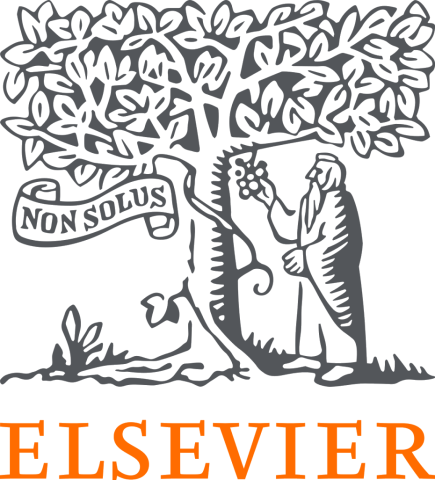
Elsevier helps researchers and healthcare professionals advance science and improve health outcomes for the benefit of society.
Discover elsevier.

You may also like

Popular resources
.css-1txxx8u{overflow:hidden;max-height:81px;text-indent:0px;} Emotions and learning: what role do emotions play in how and why students learn?
A diy guide to starting your own journal, universities, ai and the common good, artificial intelligence and academic integrity: striking a balance, create an onboarding programme for neurodivergent students.
Research often lacks full transparency and reproducibility, and poor research practices are increasingly picked up by the public, which is undermining trust in academia. Open research is research conducted with full transparency, in its design, methods and communication of outputs. Research practices that are “open” improve research quality and integrity, reuse by others and value for money. They increase public trust in research and protect against fraud.
Open research is an area that most, if not all, agree is important. However, creating a culture of openness can be challenging, especially with many competing demands and practical challenges. For instance, how many of your institution’s research outputs share the supporting data and code ? Do your researchers always know how to identify and avoid questionable research practices ?
Achieving greater openness requires long-term culture change. Here are eight key actions your university can take to stimulate that process.
1. Join or establish a national reproducibility network
Since the UK Reproducibility Network (UKRN) was founded , national reproducibility networks have been established in Australia, Germany, Slovakia and Switzerland, and the community is expanding. A reproducibility network is a peer-led consortium that promotes rigorous research practices through training and research improvement activities and dissemination of best practice and works with stakeholders to coordinate efforts across the sector.
Membership of the network requires the appointment of a senior academic as institutional lead, who reports to the pro vice-chancellor for research or equivalent and makes a minimum commitment of one day per week to the role. This ensures that open research has visible, high-level leadership within and outside the institution. If you do not have a national reproducibility network, consider setting one up .
2. Establish an open research working group
The working group should have the support of the pro vice-chancellor for research, or their equivalent, and should be led by a senior open research champion. It should include representation from your university’s professional services and the research community. The UKRN coordinates a network of open research working groups and provides guidance on how to set one up.
3. Create an action plan
An action plan, encompassing some of the actions proposed here and setting out measurable objectives to be achieved over a defined period, can give strategic direction to institutional effort. It can be a vehicle for securing engagement with open research objectives, bringing stakeholders and activities into strategic alignment, and obtaining resource to support activities.
4. Publish an open research statement
A number of UK universities have adopted statements of commitment to the principles and aims of open research . These articulate strategic objectives for the institution as a whole and expectations of researchers, and may be supported by explanatory information, links to relevant policies and practical guidance on using open practices. The process of developing and consulting on a statement brings an opportunity to engage the research community and secure buy-in from key stakeholders.
5. Run an open research competition
An open research award can celebrate best practice and incentivise researchers to identify and value their own open practices. Several universities have organised such competitions, and the UKRN has published a primer on running an open research award competition .
6. Develop an open research champions network
Institutions can cultivate allies in the research community who model good practice, amplify communications and propagate knowledge and skills within local networks. Examples of institutional programmes include the Cambridge Data Champions , Reading’s Open Research Champions , and York’s Open Research Advocates network . In the Netherlands, an Open Science Communities network has evolved and is spreading internationally. Champions can be supported with funding for activities, such as organising workshops and training, attending courses and events, and participating in open-research-related projects.
7. Develop support for research software engineering
Programming is widely used in research to generate, process and analyse data, and is often critical to reproducibility, but many researchers lack formal training in how to use software or support from trained professionals, with consequences for research quality. In recent years, institutions have established research software engineering support and training for researchers. In the UK, the Society for Research Software Engineering works to increase software skills in research and to champion the role of research software engineer.
8. Introduce open research criteria into recruitment, promotion, assessment and reward processes
Reforming academic systems to incentivise the use of open practices is critical. Recruitment, advancement and reward frameworks should enable researchers to evidence use of open practices, and open research should be built into research planning and monitoring. Introducing open research criteria into systems and processes will be a substantive project that needs to be led at the highest level.
Frameworks that might be adapted for institutional use include the UKRN hiring policies certification scheme and the European Union’s Open Science Career Assessment Matrix (OS-CAM) , a modified version of which has recently been proposed as a national assessment framework in Norway .
The measures we outline here will not transform things overnight, but ongoing strategic action by institutions can gradually bring about the change in research culture that will drive up quality, integrity and reuse.
Parveen Yaqoob is pro vice-chancellor (research and innovation) and Robert Darby is research data manager, both at the University of Reading .
If you would like advice and insight from academics and university staff delivered direct to your inbox each week, sign up for the Campus newsletter .
University of Reading Open Research Action Plan
Find out about joining or setting up a national Reproducibility Network
See this blog post for a list of UK universities that have adopted Open Research statements
UKRN primer on running an Open Research Award competition
University of Cambridge Data Champions
University of Reading Open Research Champions
University of York Open Research Advocates
Open Science Communities
Open Science Communities Starter Kit
Society for Research Software Engineering
UKRN Hiring Policies Certification Scheme
Open Science Career Assessment Matrix (OS-CAM)
NOR-CAM – a toolbox for recognition and rewards in academic careers
Emotions and learning: what role do emotions play in how and why students learn?
Global perspectives: navigating challenges in higher education across borders, how to help young women see themselves as coders, contextual learning: linking learning to the real world, authentic assessment in higher education and the role of digital creative technologies, how hard can it be testing ai detection tools.
Register for free
and unlock a host of features on the THE site
- Colleges & Universities
How to Improve Research in Your University

When evaluating how to improve research in your university, you're thinking about what your university is contributing to the world. Innovation coming out of higher education may not only affect the academic world, but society as a whole. With each year that passes, more and more innovative research stems from universities . Meanwhile, there are always ways to advance the knowledge of the students studying at your institution. Working hard to improve research in your university will surely have positive consequences all around, for both the students and the institution.
This article explains what the concept of research entails in a university setting and why research output is important in higher education. It also contains some tips for improving research quality in your school, including the benefits of university partnerships .
>> Want us to help you get accepted? Schedule a free strategy call here . <<
Listen to the blog!
Article Contents 10 min read
What is research in a university setting.
Research is the other main component of higher education besides teaching and the courses a student will register for every semester. This may seem like a rather obvious explanation, but research is often forgotten about in comparison to the prevalence of courses. However, it is just as important in terms of how a university will invest its resources. Research aids in fulfilling a school’s purpose, which is to educate and train the next generation. A research university will further perpetuate this cycle with top-quality professors and students on its campus. Due to their excellent resources, universities facilitate research that may not be possible elsewhere. They are constantly on the verge of cutting-edge technology and information. Student success in higher education depends on colleges and universities to give them the skills needed to prepare them for fulfilling careers. Improving research could allow for a significant uptick in attention to your school, making it one of the best college growth strategies . Part of achieving that goal is giving students the freedom to research and learn in the best spaces possible. The research coming out of universities is extremely innovative because schools have the tools to make these discoveries and the outreach to publicize them.
The level of research in a post-secondary setting depends on the discipline. STEM fields likely need the most attention in this regard, as they have applied research that often requires special equipment or infrastructure. Humanities programs can provide scholarships to pursue their research needs, such as publications in scholarly journals or academic books. Fine arts usually fund projects and other creative activities or exhibitions. Art studios are also an example of physical spaces necessary for research to be completed. All these disciplines can affect a school’s status as a research university.
When your institution is known as a research university, you are on another playing field entirely. A school’s ranking is greatly affected by its research output and improving research facilities may be a great tactic for school officials learning how to improve university performance . You will attract high-quality applicants and faculty as a result, with more eyes on your university than ever.
A large part of why research is important to a university is that it allows for schools to better fulfill their promise to students. When a school has top-of-the-line research facilities, their quality of education rises, and they are better able to support students.
Research opportunities unfortunately do not come from thin air. In addition to the tuition from student fees, universities often use funding from the government to help make their research happen. Why? If the schools in their country are responsible for world-changing research, the government is then responsible for it. In the case of scientific discovery, for instance, making research available to other countries is a governmental issue, rather than just a scholarly one. Research often has wider implications outside of the university walls, and that is the catalyst for receiving grants from government departments.
Facilities related to science and technology are likely also the most expensive to curate in a university, as they need the correct equipment and room to immerse the student in their research. How important is research for medical school? Some universities have entire clinics with patients, where students can gain professional experience. Offering clinical research opportunities for premedical students will be an attraction for high-quality candidates. As a result, these programs are also more likely to receive government grants.
When it comes to student research, there must be students enrolled in the university to have access to these opportunities. A school with the highest quality research will be very appealing to prospective students looking for schools to apply to. Promoting your research output and facilities is one of the best college recruitment strategies , as you are sure to advertise your school’s best assets to new students. Jumping off of that, students are more likely to stay enrolled in their programs if they are provided the best reasons to do so. If they cannot get that level of research anywhere else, they will be encouraged and proud to graduate from your institution.
Due to slowly declining enrollment rates in post-secondary schools, the conversation about how to increase college retention is a hot topic in higher education these days. The level of research and value of publications coming out of your school is inevitably linked to the will of students to remain studying with you. Students may feel compelled to switch to another school or drop out entirely if their research needs are not being met. Having state-of-the-art research facilities on your grounds is a big plus that puts your institution above others in the same area and around the world. Reputation is a crucial part of a university’s success and the evolution of its research. A positive reputation is one of the most dependable ways to attract students to your university and create a community on your campus.
The benefits of having stellar research coming out of your institution are endless and can only affect you positively , but how can your school improve its output? Your school’s mission is to appeal to student needs and give them every opportunity to succeed, and that also extends to research possibilities. Here are some tips for improving research in your university and giving students the freedom to pursue their interests:
1. Partner with Academic Consulting Services
A unique way to improve research in your institution is to partner with external academic advising services, such as BeMo Academic Consulting . Our partnerships will motivate students to produce their best work and succeed in their studies, which includes any research ventures. BeMo sets students up to perform well and helps them develop professionally and academically. By consulting with us, students will save time and money as they receive equal access to education. Unlimited support from trained admissions experts will help students with the A to Z of competitive program admissions, such as writing application documents and prep for standardized tests or interviews. BeMo consultants can also aid with career counselling, job interviews, and research resume building. Offering private, tailored help from academic consultants will help retain students at your university and assist them in their research projects as they prepare for lucrative careers.
2. Encourage Student Research Programs
Improving research initiatives at your university involves directly promoting research programs to students. When it comes to student research projects at your school, what could be better than offering the chance to pursue their own interests? For instance, students on the premed track wanting to apply to medical schools often want to gain professional research experience but are limited in their options for how to do so while studying. Either their university does not offer an opportunity in their field of interest, or they require significant travel duties or a professor to supervise them. BeMo’s ultimate premed research program will provide students with research experience that is sure to enhance their application to medical school. There is a choice between a 4-month program and a 1-year option, giving students flexibility in how they want to approach their projects.
An online independent research venture such as this one does not need any physical space or laboratory to complete and can make applications stand out without the need for travel. Using one-on-one consultations, BeMo experts help students every step of the way, from choosing the best topic and scientific research methodology to eventual presentation and publication, by providing feedback throughout the entire process. Guided workshops and exercises will further help students complete their research projects. All this will lead to a certificate of completion and reference letter that will improve student success in their med school applications. Research in your institution will improve when students are encouraged to compile and present these findings. Their passion will show in the results, and these worthwhile programs can be a great selling point for the quality of research at your institution.
3. Offer Research and Teaching Assistantships
A tried-and-true method to improving research at the university level is to offer research and teaching assistantships. Becoming an RA or a TA can span many departments and will have use in multiple career fields. These are worthwhile opportunities for students who may want them, especially since most of them are paid part-time work that a student can complete concurrently with their courses. Usually, these opportunities are reserved for graduate students, but even opening them up to upper year undergraduate students can be highly beneficial to the research output of a school. Students will get to work with their favorite professors on projects that interest them. Meanwhile, teaching assistants could learn pedagogical skills and gain further knowledge of their material by being a second-in-command to a more experienced professor. Therefore, in addition to being professional experience to contribute to a future grad school CV , assistantships can also impact a student’s own research capabilities. If they plan to apply to graduate school, they could reapply to your institution due to its familiarity and to continue their research.
4. Include Other Disciplines
While STEM fields do require a lot of attention in terms of research opportunities, it is important to remember all the other faculties and departments that make up a university’s curriculum. If your school offers these programs, they should also be considered just as heavily. Any research from fine arts, business, marketing, the humanities, political science, and more could add to a university’s overall performance rate. Just like how a school could be known for their premed track or their engineering graduates, they could also garner a positive reputation for any one of these fields. To some, majors within the arts or the humanities are often considered abstract and less valuable from a research standpoint, but this is a misconception. They have their own public figures, awards, conferences, and other academic events that represent the best research published. Therefore, research initiatives for these fields also have benefits for a university that puts in the effort to improve them.
First, they can be less expensive to fund, which can be a more suitable option for smaller colleges looking to improve their research output. Second, these disciplines contribute to the overall culture of the university itself, the city that the school is in, and maybe even the world at large, if popular enough. Political studies, literature publications, and art works have the ability to traverse borders and will have a long-term impact. Despite not being immediately obvious, these often-overlooked programs and their research can create a lasting difference in academia and elsewhere.
5. Update Libraries and Databases
Access to information is very much aligned with research. Make sure your library services are as updated as possible. A library that is both visually appealing and filled with a collection of relevant books will encourage students to use its services. Research databases such as JSTOR , ScienceDirect , Academic Search Complete , and Project MUSE are a staple for many academics when looking for secondary sources. They are the best resources for accessing the most current journals or publications. Without access to these databases, a student may not be able to explore all the avenues they want to, and the research may suffer as a result. Having up-to-date subscriptions to the most popular databases will only benefit the productivity of your school.
The staff you employ to help students could also improve research. Make sure to hire the best librarians and academic advisors trained to assist students with their research or other academic needs. Your students’ grades, morale, and research will surely improve when there are university personnel there to help them achieve their goals. Implement the top job satisfaction factors to retain your best employees so that they can be at their best at all times to support student success.
Improving research in your institution is a multi-faceted and complicated undertaking. There are many ways to go about improving your school’s research initiatives, but to sum it all up, being inclusive of various academic disciplines is a strong way to diversify the content your university is associated with. Having multiple well-developed departments and programs will never hurt your school’s reputation.
Listening to the concerns of students is a great way to figure out where to start improving the research output in your school. Having external help from academic consulting services will make your school stand out to future applicants and encourage current students to work hard on their research projects.
Research is another main component of university-level education, along with teaching and courses. It is the scholarship that a particular school works on and publishes for the consumption of other academics or society as a whole. University research could have a large amount of impact on whatever field it comes from and is sometimes acknowledged internationally or on a global scale.
Being labelled a research university is typically a compliment and a great note for a school’s reputation. Whether it is in a particular subject or not, it means you are being recognized for superior research. For instance, Harvard University in Massachusetts is primarily known for its law school , but it is an Ivy League institution that has made multiple research contributions to the world and is generally recognized by the public as one of the highest-quality post-secondary schools.
Improving research quality at your school can be one of the more creative ways to increase college enrollment , as it may not be immediately apparent. If your school has better research quality than others in its area or country, it will affect the word of mouth that will travel from the graduate level to the freshman level. Your school’s reputation will improve over time, leading to more eyes on your university and more students interested in seeing what all the fuss is about. Superior research facilities can also be a great feature of open houses, recruitment materials, and posts on social media for prospective students to see.
Students want to feel like they are being supported and that their work matters. It is not the be-all and end-all to dropout prevention , but when their research needs are met, students will be more likely to feel satisfied with their education.
Science, technology, engineering, and math fields should not be the sole faculties considered for research funding in your school, but these programs are often the most expensive. They would need the largest amount of space, tools, and equipment to effectively improve their students’ research capabilities. Labs are crucial to the delivery of courses as well as research projects. The research in these fields is also the most likely to be tied to government grants, as their work is more likely to have larger global implications.
Yes, absolutely. Each discipline has merit, and they all have their own opportunities to make a dent in academic circles. Students in any major should be given the opportunity to properly follow their passion. While schools will always put more effort into some programs over others, research is crucial to the development of every field, whether it is STEM or not.
The goal of college admissions consulting is to motivate students and give them tailored advice when pursuing their dreams. Part of this includes their application documents, but also the actual research they are performing. Consultants could give tips and aid students with the direction of their research.
In addition to our premed research program, BeMo also offers DocShadowing , a service in which students can shadow a doctor online to explore different specialties, receive training on medical concepts, and improve their research overall.
Students can also become a BeMo premed student brand ambassador . In this role, students promote BeMo services on social media and their college campuses on a part-time basis.
Want more free tips? Subscribe to our channels for more free and useful content!
Apple Podcasts
Like our blog? Write for us ! >>
Have a question ask our admissions experts below and we'll answer your questions, get started now.
Talk to one of our admissions experts
Our site uses cookies. By using our website, you agree with our cookie policy .

- Policy & Compliance
- Peer Review Policies and Practices
Revisions to the NIH Fellowship Application and Review Process
NIH is revising the application and review criteria for fellowship applications, beginning with those submitted January 25, 2025 and beyond. This page describes the goals of the change, implications for those writing and reviewing fellowship applications, and provides links to training and other resources.
Fellowship applications submitted on or after January 25, 2025 will follow a revised application and review criteria. The goal of the changes is to improve the chances that the most promising fellowship candidates will be consistently identified by scientific review panels. The changes will:
- Better focus reviewer attention on three key assessments: the fellowship candidate’s preparedness and potential, research training plan, and commitment to the candidate
- Ensure a broad range of candidates and research training contexts can be recognized as meritorious by clarifying and simplifying the language in the application and review criteria
- Reduce bias in review by emphasizing the commitment to the candidate without undue consideration of sponsor and institutional reputation
Background
This page is designed to help you learn more about the peer review process and why we’re revising the application and review process for NIH fellowship applications submitted for due dates on or after January 25, 2025.
Changes to Fellowship Applications
Learn more about the changes being made to fellowship application forms and instructions for due dates on or after January 25, 2025.
Changes to the Fellowship Review Criteria
Learn more about the changes being made to the fellowship review criteria for applications submitted for due dates on or after January 25, 2025.
Candidate Guidance
This page provides guidance for candidates applying to fellowships for due dates on or after January 25, 2025
Reviewer Guidance (Coming in 2025)
Reviewers will be provided training and guidance materials in Spring 2025 in time for the first review meetings held in the summer of 2025 using the revised review criteria.
FAQs
Find answers to your questions about the revisions to fellowship application and review criteria.
Training and Resources
Training and resources, including presentations, webinars, and other resources to help you understand the revised fellowship application and peer review process are found on this site.
Notices, Statements, and Reports
This page provides links to Notices, blog posts, press releases, and other background reports on the revised fellowship application and review criteria.
This page last updated on: April 18, 2024
- Bookmark & Share
- E-mail Updates
- Help Downloading Files
- Privacy Notice
- Accessibility
- National Institutes of Health (NIH), 9000 Rockville Pike, Bethesda, Maryland 20892
- NIH... Turning Discovery Into Health
- See us on facebook
- See us on twitter
- See us on youtube
- See us on linkedin
- See us on instagram
AI improves accuracy of skin cancer diagnoses in Stanford Medicine-led study
Artificial intelligence algorithms powered by deep learning improve skin cancer diagnostic accuracy for doctors, nurse practitioners and medical students in a study led by the Stanford Center for Digital Health.
April 11, 2024 - By Krista Conger

Artificial intelligence helped clinicians diagnose skin cancer more accurately, a Stanford Medicine-led study found. Chanelle Malambo/peopleimages.com - stock.adobe.com
A new study led by researchers at Stanford Medicine finds that computer algorithms powered by artificial intelligence based on deep learning can help health care practitioners to diagnose skin cancers more accurately. Even dermatologists benefit from AI guidance, although their improvement is less than that seen for non-dermatologists.
“This is a clear demonstration of how AI can be used in collaboration with a physician to improve patient care,” said professor of dermatology and of epidemiology Eleni Linos , MD. Linos leads the Stanford Center for Digital Health , which was launched to tackle some of the most pressing research questions at the intersection of technology and health by promoting collaboration between engineering, computer science, medicine and the humanities.
Linos, associate dean of research and the Ben Davenport and Lucy Zhang Professor in Medicine, is the senior author of the study , which was published on April 9 in npj Digital Medicine . Postdoctoral scholar Jiyeong Kim , PhD, and visiting researcher Isabelle Krakowski, MD, are the lead authors of the research.
“Previous studies have focused on how AI performs when compared with physicians,” Kim said. “Our study compared physicians working without AI assistance with physicians using AI when diagnosing skin cancers.”
AI algorithms are increasingly used in clinical settings, including dermatology. They are created by feeding a computer hundreds of thousands or even millions of images of skin conditions labeled with information such as diagnosis and patient outcome. Through a process called deep learning, the computer eventually learns to recognize telltale patterns in the images that correlate with specific skin diseases including cancers. Once trained, an algorithm written by the computer can be used to suggest possible diagnoses based on an image of a patient’s skin that it has not been exposed to.

Eleni Linos
These diagnostic algorithms aren’t used alone, however. They are overseen by clinicians who also assess the patient, come to their own conclusions about a patient’s diagnosis and choose whether to accept the algorithm’s suggestion.
An accuracy boost
Kim and Linos’ team reviewed 12 studies detailing more than 67,000 evaluations of potential skin cancers by a variety of practitioners with and without AI assistance. They found that, overall, health care practitioners working without aid from artificial intelligence were able to accurately diagnose about 75% of people with skin cancer — a statistical measurement known as sensitivity. Conversely, the workers correctly diagnosed about 81.5% of people with cancer-like skin conditions but who did not have cancer — a companion measurement known as specificity.
Health care practitiones who used AI to guide their diagnoses did better. Their diagnoses were about 81.1% sensitive and 86.1% specific. The improvement may seem small, but the differences are critical for people told they don’t have cancer, but do, or for those who do have cancer but are told they are healthy.
When the researchers split the health care practitioners by specialty or level of training, they saw that medical students, nurse practitioners and primary care doctors benefited the most from AI guidance — improving on average about 13 points in sensitivity and 11 points in specificity. Dermatologists and dermatology residents performed better overall, but the sensitivity and specificity of their diagnoses also improved with AI.
“I was surprised to see everyone’s accuracy improve with AI assistance, regardless of their level of training,” Linos said. “This makes me very optimistic about the use of AI in clinical care. Soon our patients will not just be accepting, but expecting, that we use AI assistance to provide them with the best possible care.”

Jiyeong Kim
Researchers at the Stanford Center for Digital Health, including Kim, are interested in learning more about the promise of and barriers to integrating AI-based tools into health care. In particular, they are planning to investigate how the perceptions and attitudes of physicians and patients to AI will influence its implementation.
“We want to better understand how humans interact with and use AI to make clinical decisions,” Kim said.
Previous studies have indicated that a clinician’s degree of confidence in their own clinical decision, the degree of confidence of the AI, and whether the clinician and the AI agree on the diagnosis all influence whether the clinician incorporates the algorithm’s advice when making clinical decisions for a patient.
Medical specialties like dermatology and radiology, which rely heavily on images — visual inspection, pictures, X-rays, MRIs and CT scans, among others — for diagnoses are low-hanging fruit for computers that can pick out levels of detail beyond what a human eye (or brain) can reasonably process. But even other more symptom-based specialties, or prediction modeling, are likely to benefit from AI intervention, Linos and Kim feel. And it’s not just patients who stand to benefit.
“If this technology can simultaneously improve a doctor’s diagnostic accuracy and save them time, it’s really a win-win. In addition to helping patients, it could help reduce physician burnout and improve the human interpersonal relationships between doctors and their patients,” Linos said. “I have no doubt that AI assistance will eventually be used in all medical specialties. The key question is how we make sure it is used in a way that helps all patients regardless of their background and simultaneously supports physician well-being.”
Researchers from the Karolinska Institute, the Karolinska University Hospital and the University of Nicosia contributed to the research.
The study was funded by the National Institutes of Health (grants K24AR075060 and R01AR082109), Radiumhemmet Research, the Swedish Cancer Society and the Swedish Research Council.
For more news about responsible AI in health and medicine, sign up for the RAISE Health newsletter.
Register for the RAISE Health Symposium on May 14.

About Stanford Medicine
Stanford Medicine is an integrated academic health system comprising the Stanford School of Medicine and adult and pediatric health care delivery systems. Together, they harness the full potential of biomedicine through collaborative research, education and clinical care for patients. For more information, please visit med.stanford.edu .
Artificial intelligence
Exploring ways AI is applied to health care

An official website of the United States government
The .gov means it’s official. Federal government websites often end in .gov or .mil. Before sharing sensitive information, make sure you’re on a federal government site.
The site is secure. The https:// ensures that you are connecting to the official website and that any information you provide is encrypted and transmitted securely.
ARPA-H launches Exploration Topic to improve chatbots for patient-facing applications
Published April 19, 2024
ARPA-H launches new Exploration Topic to improve chatbots for patient-facing applications
The Advanced Research Projects Agency for Health ( ARPA-H ) today launched the Chatbot Accuracy and Reliability Evaluation (CARE) Exploration Topic (ET) to fund the development of novel technical approaches to improve the testing and evaluation of chatbot outputs for patient-facing applications. More than half of American households use the internet for health-related activities, including researching health information. However, up to 50% of the outputs from state-of-the-art chatbots contain at least one serious instance where content is incorrect or unsubstantiated.
The CARE ET aims to produce tools and technology to better evaluate medical chatbots for patient-facing applications with the efficiency of computational methods and the accuracy of human experts. The CARE ET will develop and test proof-of-concept evaluation technologies for large language models (LLMs) across a variety of use cases, providing a critical resource for those developing LLM applications for health care and helping to de-risk ARPA-H’s future LLM portfolio. The technologies created through the CARE ET will not only assess safety by detecting hallucinations but will address previous biases of medical chatbots by considering stakeholder desires and concerns.
“Despite their growing use and promising applications, large language models suffer from reliability and accuracy issues that prevent them from being more widely adopted,” said ARPA-H Resilient Systems Office Director Jennifer Roberts . “By funding technologies to improve the testing and evaluation of medical chatbot outputs, ARPA-H is taking a big step in its mission by helping improve access to accurate online health information for everyone.”
To develop this technology, the CARE ET will pursue innovation within a single Technical Area divided into two parallel and interconnected subsections: (1) improve prompt generation technology to effectively examine the full range of LLM responses and criteria that inform the evaluation of trustworthiness of LLM outputs, and (2) develop novel chatbot evaluation technologies that perform at the speed of computational methods with the accuracy of expert human review.
The CARE ET will focus on public-facing chatbots, but the tools and procedures developed will have far broader applications, including clinician support, biomedical research, input for regulatory guidance, and other health-related areas.
ETs are fast-paced efforts that pursue topics strategically aligned with ARPA-H Mission Offices and provide foundational proofs-of-concept to be used in future research. ETs allow for a streamlined solicitation and acquisition approach. For more information, view the CARE ET on SAM.gov .
- SUGGESTED TOPICS
- The Magazine
- Newsletters
- Managing Yourself
- Managing Teams
- Work-life Balance
- The Big Idea
- Data & Visuals
- Reading Lists
- Case Selections
- HBR Learning
- Topic Feeds
- Account Settings
- Email Preferences
6 Common Leadership Styles — and How to Decide Which to Use When
- Rebecca Knight

Being a great leader means recognizing that different circumstances call for different approaches.
Research suggests that the most effective leaders adapt their style to different circumstances — be it a change in setting, a shift in organizational dynamics, or a turn in the business cycle. But what if you feel like you’re not equipped to take on a new and different leadership style — let alone more than one? In this article, the author outlines the six leadership styles Daniel Goleman first introduced in his 2000 HBR article, “Leadership That Gets Results,” and explains when to use each one. The good news is that personality is not destiny. Even if you’re naturally introverted or you tend to be driven by data and analysis rather than emotion, you can still learn how to adapt different leadership styles to organize, motivate, and direct your team.
Much has been written about common leadership styles and how to identify the right style for you, whether it’s transactional or transformational, bureaucratic or laissez-faire. But according to Daniel Goleman, a psychologist best known for his work on emotional intelligence, “Being a great leader means recognizing that different circumstances may call for different approaches.”
- RK Rebecca Knight is a journalist who writes about all things related to the changing nature of careers and the workplace. Her essays and reported stories have been featured in The Boston Globe, Business Insider, The New York Times, BBC, and The Christian Science Monitor. She was shortlisted as a Reuters Institute Fellow at Oxford University in 2023. Earlier in her career, she spent a decade as an editor and reporter at the Financial Times in New York, London, and Boston.
Partner Center
Numbers, Facts and Trends Shaping Your World
Read our research on:
Full Topic List
Regions & Countries
- Publications
- Our Methods
- Short Reads
- Tools & Resources
Read Our Research On:
How the American middle class has changed in the past five decades
The middle class, once the economic stratum of a clear majority of American adults, has steadily contracted in the past five decades. The share of adults who live in middle-class households fell from 61% in 1971 to 50% in 2021, according to a new Pew Research Center analysis of government data.
From 2020: Are you in the American middle class? Find out with our income calculator
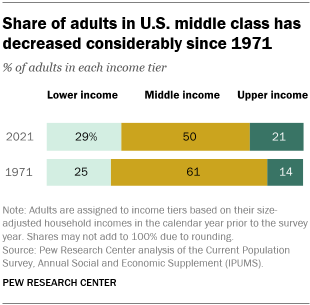
The shrinking of the middle class has been accompanied by an increase in the share of adults in the upper-income tier – from 14% in 1971 to 21% in 2021 – as well as an increase in the share who are in the lower-income tier, from 25% to 29%. These changes have occurred gradually, as the share of adults in the middle class decreased in each decade from 1971 to 2011, but then held steady through 2021.
The analysis below presents seven facts about how the economic status of the U.S. middle class and that of America’s major demographic groups have changed since 1971. A related analysis examines the impact of the coronavirus pandemic on the financial well-being of households in the lower-, middle- and upper-income tiers, with comparisons to the Great Recession era. (In the source data for both analyses, demographic figures refer to the 1971-2021 period, while income figures refer to the 1970-2020 period. Thus, the shares of adults in an income tier are based on their household incomes in the previous year.)
This report analyzes data from the Annual Social and Economic Supplements (ASEC) of the Current Population Survey (CPS) to study how the economic status of the American middle class has changed since 1971. It also examines the movement of demographic groups in and out of the American middle class and across lower- and upper-income tiers from 1971 to 2021.
The CPS is the U.S. government’s official source for monthly estimates of unemployment ; the ASEC, conducted in March each year, is the official source for its estimates of income and poverty . The COVID-19 outbreak has affected data collection efforts by the U.S. government in its surveys, limiting in-person data collection and affecting the response rate. It is possible that some measures of economic outcomes and how they vary across demographic groups are affected by these changes in data collection. This report makes use of updated weights released by the Census Bureau to correct for nonresponse in 2019, 2020 and 2021.
In this analysis, “middle-income” adults in 2021 are those with an annual household income that was two-thirds to double the national median income in 2020, after incomes have been adjusted for household size, or about $52,000 to $156,000 annually in 2020 dollars for a household of three. “Lower-income” adults have household incomes less than $52,000 and “upper-income” adults have household incomes greater than $156,000.
The income it takes to be middle income varies by household size, with smaller households requiring less to support the same lifestyle as larger households. The boundaries of the income tiers also vary across years with changes in the national median income. Read the methodology for more details.
The terms “middle income” and “middle class” are used interchangeably in this analysis for the sake of exposition. But being middle class can refer to more than just income, be it the level of education, the type of profession, economic security, home ownership, or one’s social and political values. Class also could simply be a matter of self-identification.
Household incomes have risen considerably since 1970, but those of middle-class households have not climbed nearly as much as those of upper-income households. The median income of middle-class households in 2020 was 50% greater than in 1970 ($90,131 vs. $59,934), as measured in 2020 dollars. These gains were realized slowly, but for the most part steadily, with the exception of the period from 2000 to 2010, the so-called “ lost decade ,” when incomes fell across the board.
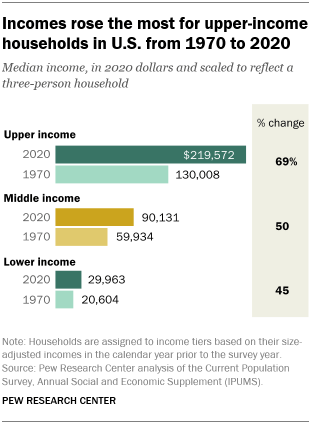
The median income for lower-income households grew more slowly than that of middle-class households, increasing from $20,604 in 1970 to $29,963 in 2020, or 45%.
The rise in income from 1970 to 2020 was steepest for upper-income households. Their median income increased 69% during that timespan, from $130,008 to $219,572.
As a result of these changes, the gap in the incomes of upper-income and other households also increased. In 2020, the median income of upper-income households was 7.3 times that of lower-income households, up from 6.3 in 1970. The median income of upper-income households was 2.4 times that of middle-income households in 2020, up from 2.2 in 1970.
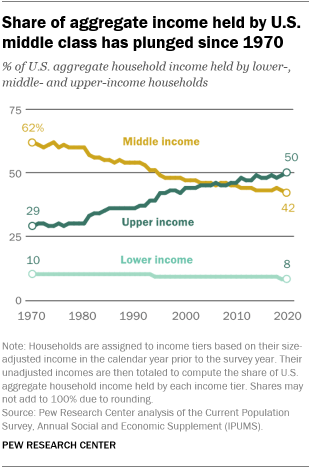
The share of aggregate U.S. household income held by the middle class has fallen steadily since 1970. The widening of the income gap and the shrinking of the middle class has led to a steady decrease in the share of U.S. aggregate income held by middle-class households. In 1970, adults in middle-income households accounted for 62% of aggregate income, a share that fell to 42% in 2020.
Meanwhile, the share of aggregate income accounted for by upper-income households has increased steadily, from 29% in 1970 to 50% in 2020. Part of this increase reflects the rising share of adults who are in the upper-income tier.
The share of U.S. aggregate income held by lower-income households edged down from 10% to 8% over these five decades, even though the proportion of adults living in lower-income households increased over this period.
Older Americans and Black adults made the greatest progress up the income ladder from 1971 to 2021. Among adults overall, the share who were in the upper-income tier increased from 14% in 1971 to 21% in 2021, or by 7 percentage points. Meanwhile, the share in the lower-income tier increased from 25% to 29%, or by 4 points. On balance, this represented a net gain of 3 percentage points in income status for all adults.
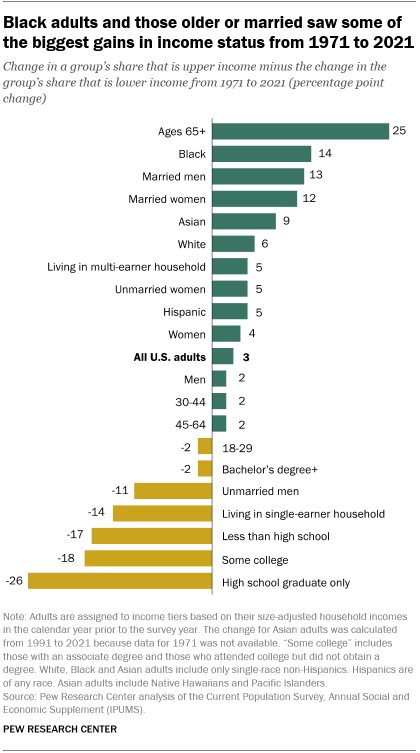
Those ages 65 and older made the most notable progress up the income ladder from 1971 to 2021. They increased their share in the upper-income tier while reducing their share in the lower-income tier, resulting in a net gain of 25 points. Progress among adults 65 and older was likely driven by an increase in labor force participation , rising educational levels and by the role of Social Security payments in reducing poverty.
Black adults, as well as married men and women, were also among the biggest gainers from 1971 to 2021, with net increases ranging from 12 to 14 percentage points.
On the other hand, not having at least a bachelor’s degree resulted in a notable degree of economic regression over this period. Adults with a high school diploma or less education, as well as those with some college experience but no degree, saw sizable increases in their shares in the lower-income tier in the past five decades. Although no single group of adults by education category moved up the income ladder from 1971 to 2021, adults overall realized gains by boosting their education levels . The share of adults 25 and older who had completed at least four years of college stood at 38% in 2021, compared with only 11% in 1971.
Progress up the income ladder for a demographic group does not necessarily signal its economic status in comparison with other groups at a given point in time. For example, in 2021, adults ages 65 and older and Black adults were still more likely than many other groups to be lower income, and less likely to be middle or upper income.
Married adults and those in multi-earner households made more progress up the income ladder from 1971 to 2021 than their immediate counterparts. Generally, partnered adults have better outcomes on a range of economic outcomes than the unpartnered. One reason is that marriage is increasingly linked to educational attainment , which bears fruit in terms of higher incomes.
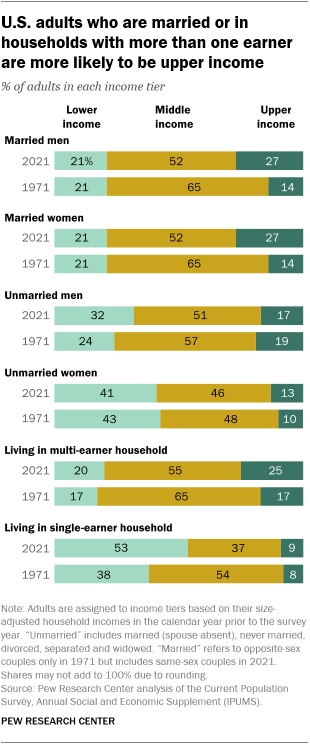
Married men and women were distributed across the income tiers identically to each other in both 1971 and 2021. Both groups nearly doubled their shares in the upper-income tier in the past five decades, from 14% in 1971 to 27% in 2021. And neither group experienced an increase in the share in the lower-income tier.
Unmarried men and women were much more likely than their married counterparts to be in the lower-income tier in 2021. And unmarried men, in particular, experienced a sizable increase in their share in the lower-income tier from 1971 t0 2021 and a similarly large decrease in their share in the middle-income tier. Nonetheless, unmarried men are less likely than unmarried women to be lower income and more likely to be middle income.
Adults in households with more than one earner fare much better economically than adults in households with only one earner. In 2021, some 20% of adults in multi-earner households were in the lower-income tier, compared with 53% of adults in single-earner households. Also, adults in multi-earner households were more than twice as likely as adults in single-earner households to be in the upper-income tier in 2021. In the long haul, adults in single-earner households are among the groups who slid down the income ladder the most from 1971 to 2021.

Despite progress, Black and Hispanic adults trail behind other groups in their economic status. Although Black adults made some of the biggest strides up the income tiers from 1971 to 2021, they, along with Hispanic adults, are more likely to be in the lower-income tier than are White or Asian adults. About 40% of both Black and Hispanic adults were lower income in 2021, compared with 24% of White adults and 22% of Asian adults.
Black adults are the only major racial and ethnic group that did not experience a decrease in its middle-class share, which stood at 47% in 2021, about the same as in 1971. White adults are the only group in which more than half (52%) lived in middle-class households in 2021, albeit after declining from 63% in 1971. At the top end, only about one-in-ten Black and Hispanic adults were upper income in 2021, compared with one-in-four or more White and Asian adults.
The relative economic status of men and women has changed little from 1971 to 2021. Both experienced similar percentage point increases in the shares in the lower- and upper-income tiers, and both saw double-digit decreases in the shares who are middle class. Women remained more likely than men to live in lower-income households in 2021 (31% vs. 26%).
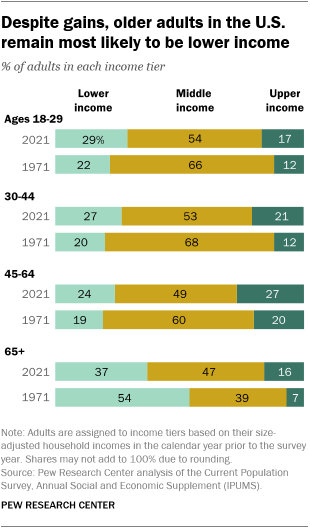
Adults 65 and older continue to lag economically, despite decades of progress. The share of adults ages 65 and older in the lower-income tier fell from 54% in 1971 to 37% in 2021. Their share in the middle class rose from 39% to 47% and their share in the upper-income tier increased from 7% to 16%. However, adults 65 and older are the only age group in which more than one-in-three adults are in lower-income households, and they are much less likely than adults ages 30 to 44 – as well as those ages 45 to 64 – to be in the upper-income tier.
All other age groups experienced an increase in the shares who are lower income from 1971 to 2021, as well as a decrease in the shares who are middle income. But they also saw increases in the shares who are upper income. Among adults ages 30 to 44, for instance, the share in upper-income households almost doubled, from 12% in 1971 to 21% in 2021.
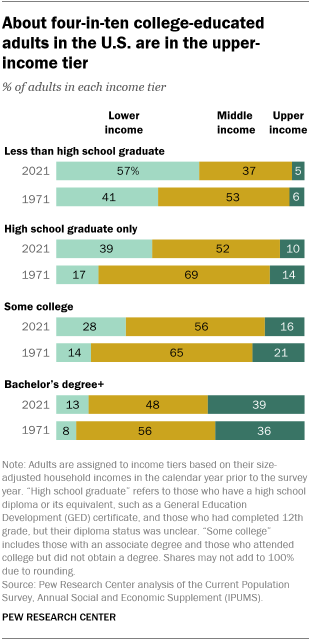
There is a sizable and growing income gap between adults with a bachelor’s degree and those with lower levels of education. In 2021, about four-in-ten adults with at least a bachelor’s degree (39%) were in the upper-income tier, compared with 16% or less among those without a bachelor’s degree. The share of adults in the upper-income tier with at least a bachelor’s degree edged up from 1971 to 2021, while the share without a bachelor’s degree either edged down or held constant.
About half or a little more of adults with either some college education or a high school diploma only were in the middle class in 2021. But these two groups, along with those with less than a high school education, experienced notable drops in their middle class shares from 1971 to 2021 – and notable increases in the shares in the lower-income tier. In 2021, about four-in-ten adults with only a high school diploma or its equivalent (39%) were in the lower-income tier, about double the share in 1971.
Note: Here is the methodology for this analysis.
- Economic Inequality
- Income & Wages
- Middle Class

1 in 10: Redefining the Asian American Dream (Short Film)
The hardships and dreams of asian americans living in poverty, a booming u.s. stock market doesn’t benefit all racial and ethnic groups equally, black americans’ views on success in the u.s., wealth surged in the pandemic, but debt endures for poorer black and hispanic families, most popular.
1615 L St. NW, Suite 800 Washington, DC 20036 USA (+1) 202-419-4300 | Main (+1) 202-857-8562 | Fax (+1) 202-419-4372 | Media Inquiries
Research Topics
- Age & Generations
- Coronavirus (COVID-19)
- Economy & Work
- Family & Relationships
- Gender & LGBTQ
- Immigration & Migration
- International Affairs
- Internet & Technology
- Methodological Research
- News Habits & Media
- Non-U.S. Governments
- Other Topics
- Politics & Policy
- Race & Ethnicity
- Email Newsletters
ABOUT PEW RESEARCH CENTER Pew Research Center is a nonpartisan fact tank that informs the public about the issues, attitudes and trends shaping the world. It conducts public opinion polling, demographic research, media content analysis and other empirical social science research. Pew Research Center does not take policy positions. It is a subsidiary of The Pew Charitable Trusts .
Copyright 2024 Pew Research Center
Terms & Conditions
Privacy Policy
Cookie Settings
Reprints, Permissions & Use Policy

Hi, what are you looking for?
Alabama Political Reporter

Committees approve bills to ensure Biden is on the ballot in November

Daniels reflects on CD2 results, commits to support Democrats

Sen. Katie Britt endorses Dobson in 2nd Congressional District

Opinion | Alabama must ban ranked choice voting to ensure secure elections

Figures, Dobson to face off in November general election

Gov. Ivey signs bill making Alabama’s anti-human trafficking law toughest in the nation

Southern governors denounce UAW unionization campaign

Gov. Ivey announces Two Rivers Lumber plans $115 million sawmill project

Gov. Ivey awards $5.8 million in grants to weatherize homes of low-income residents

Gov. Kay Ivey marks seven years in office, infrastructure funding

Committee advances bill to repeal BSC bailout law

Alabama House passes $11B education budget package

House passes 18 percent cut to state library operations budget

Historic gambling bill faces critical test in conference committee

Former governors support bill for resentencing judicial override cases

Small business optimism reaches lowest level since 2012

Mercedes Benz workers file for an election to join the UAW

Gov. Ivey: Economic development projects inject $6 billion into Alabama communities
Mercedes workers file federal charges with NLRB to stop union busting

Alabama’s labor rate steady at 57.4 percent

Sens. Katie Britt, Laphonza Butler introduce bill to fund maternal mortality research

Miranda Holloway-Baggett nominated to be U.S. marshal for the Southern District of Alabama

Sewell honors retirement of Tennessee State’s first woman president

Alabama man charged with detonating explosive device outside Alabama AG’s Office

Sewell introduces legislation to rename post office after civil rights leader

Hoover schools block library app to find, remove “sexual content”
New statewide coalition seeks changes to Alabama’s school funding policy

UA hosts senators, highlights dyslexia program success and teacher impact

Stillman finalizes partnership with BSC to accept student transfers

Sen. Britt celebrates Tuskegee’s new flight school, backed by $6.7 million grant

Montgomery psychiatrist named president of Alabama Medical Association

Alabama doctors unveil “Your Care is at Our Core,” emphasizing personal connections

Medical center in Mobile resumes IVF services

ALFA Insurance targets health sector amid regulatory debate in Alabama

Judges choose two Alabama Performance Excellence winners

Opinion | There’s one way to solve Alabama’s illegal gambling issue: we already have it

Opinion | Dobson v. Figures: Can the Democrats cash in?

Opinion | Last roll of the dice on Alabama’s gambling bill

Opinion | State leaders all aboard on “Working for Alabama” plan

Opinion | High school graduation, college and career readiness rates improve
The legislation would ensure consistent funding for research on maternal care and mortality.
Published on April 18, 2024 at 7:59 am CDT

U.S. Senators Katie Britt, R-Ala., and Laphonza Butler, D-Calif., today introduced the NIH IMPROVE Act , the Senate Companion to Representative Lauren Underwood’s, D-IL-14, and Brian Fitzpatrick’s, R-PA-01, House bill, which would ensure consistent funding for research on maternal care and mortality.
In 2019, the National Institutes of Health (NIH) launched the Implementing a Maternal Health and Pregnancy Outcomes Vision for Everyone (IMPROVE) Initiative. The IMPROVE Initiative supports research to reduce preventable causes of maternal deaths and improve health care for women before, during, and after pregnancy.
However, this critical research program lacks a sustained funding source, threatening research outcomes and conclusions. The NIH IMPROVE Act would authorize consistent funding for this existing program for the next seven years, providing NIH the support and resources to pursue research into the root causes of America’s maternal mortality crisis.
“This bipartisan legislation will support targeted funding for critical research to improve health outcomes for women throughout their pregnancy journey,” said Senator Britt. “I’m proud to fight for moms and women across Alabama and America.”
“There are huge gaps in maternal care, especially across racial and socioeconomic lines, and the NIH IMPROVE Act will sustain much-needed research to better understand how we can protect mothers and end preventable maternal deaths,” said Senator Butler.
The NIH IMPROVE Act would:
- Authorize $53.4 million annually for seven years to carry out the IMPROVE Initiative and support research on potential causes of maternal mortality and severe morbidity.
- Approve research that would target disparities associated with maternal mortality and severe morbidity, and aim to reduce preventable causes of maternal deaths.
- Build an evidence base for improved care and outcomes in underserved maternal care deserts.
The full text of the bill can be viewed here .
In Alabama, over a third of its 67 counties are classified as “maternity care deserts,” areas without access to birthing facilities or maternity care providers. Last fall, three Alabama hospitals announced closures of their labor and delivery departments, leaving both Shelby and Monroe counties without labor and delivery services. Additionally, Alabama has the highest maternal mortality rate in the nation at 64.63 deaths per 100,000 births.
Senator Britt has made health care, including maternal care, a top legislative priority during her first 15 months in office. This week, Senator Britt during a Senate Appropriations Subcommittee Hearing questioned U.S. Secretary of Health and Human Services (HHS) Xavier Becerra on the President’s proposed FY25 budget for HHS. Specifically, she highlighted the United States’ maternal mortality crisis, and pressed Secretary Becerra on the budget proposal’s reduction in funding to the Title V Maternal and Child Health Services Grants for states, which would negatively impact rural communities in providing quality care to mothers and children.
Recently, Senator Britt joined Senators Maggie Hassan, D-N.H., Susan Collins, R-Maine, and Tina Smith, D-Minn., in introducing the Rural Obstetrics Readiness Act . This legislation would expand access to maternal care by offering support for rural health care facilities and doctors to provide urgent obstetric care.
Senator Britt also reintroduced the Access to Breast Cancer Diagnosis (ABCD) Act with Senator Jeanne Shaheen, D-N.H., in September 2023. This bipartisan, bicameral legislation would eliminate copays and other out-of-pocket expenses for breast cancer diagnostic tests, making them more accessible and affordable.
Last December, Senator Britt joined a bipartisan group of 59 of her Senate colleagues in reintroducing the Creating Opportunities Now for Necessary and Effective Care Technologies (CONNECT) for Health Act of 2023. This bill would expand coverage of telehealth services through Medicare, make permanent COVID-19 telehealth flexibilities, improve health outcomes, and make it easier for patients to connect with their doctors, especially important in rural areas.
Additionally, she cosponsored two pieces of bipartisan legislation to help all Alabamians access insulin. They include the Affordable Insulin Now Act of 2023 , which would cap the price of insulin for all patients, including those who are uninsured, at $35 for a 30-day supply; and the Improving Needed Safeguards for Users of Lifesaving Insulin Now (INSULIN) Act of 2023 , which would comprehensively address the skyrocketing costs of insulin, removing barriers to care and making it more accessible for millions more Americans.
Senator Britt, along with Senator Amy Klobuchar, D-Minn., also introduced the Youth Mental Health Research Act to create a national Youth Mental Health Research Initiative to guide long-term mental health care efforts, better target preventive interventions for those at risk of developing mental health challenges, and improve treatments for children.
Last month, Senator Britt secured significant funding in the Labor, Health and Human Services, Education, and Related Agencies Appropriations Act to modernize and upgrade medical equipment and rural health services in Alabama. This funding includes $2.6 million for Helen Keller Hospital to replace generators and help more Alabamians receive excellent, high-quality medical care; over $3.9 million for the City of Talladega to support rural emergency services; $2 million for needed medical equipment at Atmore Community Hospital; and $2.5 million in directed spending for the Huntsville Hospital Health System to purchase additional ambulances to serve counties across North Alabama.
The Alabama Political Reporter is a daily political news site devoted to Alabama politics. We provide accurate, reliable coverage of policy, elections and government.

Advocate’s incarcerated husband stabbed

Alabama’s gambling problem: Barrels of money and no regulation

Featured Opinion

New legal filing seeks to remove Cannabis Commission from licensing process

Project Say Something, Florence to erect marker on racist origins of “Eternal Vigil”

Legislature
Some legislation to watch: legislature faces critical last days.

More from APR

"Caroleene Dobson is not just a distinguished attorney, but also a devoted wife and mother," Britt said.

An estimated 20 percent of Americans live with dyslexia, a figure that brings to light the pressing need for specialized educational strategies.

This initiative not only honors the legacy of the Tuskegee Airmen but also paves a new path for future aviators.

Opinion | How long are Republicans going to do this to themselves?
A large portion of the GOP has been pretending to believe really dumb things for years now, and the price has been national ridicule.
- Warning Signs and Symptoms
- Mental Health Conditions
- Common with Mental Illness
- Mental Health By the Numbers
- Individuals with Mental Illness
- Family Members and Caregivers
- Kids, Teens and Young Adults
- Veterans & Active Duty
- Identity and Cultural Dimensions
- Frontline Professionals
- Mental Health Education
- Support Groups
- NAMI HelpLine
- Publications & Reports
- Podcasts and Webinars
- Video Resource Library
- Justice Library
- Find Your Local NAMI
- Find a NAMIWalks
- Attend the NAMI National Convention
- Fundraise Your Way
- Create a Memorial Fundraiser
- Pledge to Be StigmaFree
- Awareness Events
- Share Your Story
- Partner with Us
- Advocate for Change
- Policy Priorities
- NAMI Advocacy Actions
- Policy Platform
- Crisis Intervention
- State Fact Sheets
- Public Policy Reports
How Volunteering Improves Mental Health
February 02, 2022
By Trish Lockard

While sitting in a waiting room at a doctor’s office in 2014, I struck up a conversation with the woman sitting next to me. As we got acquainted, she told me she was deeply involved with an organization called the National Alliance on Mental Illness (NAMI). I hadn’t heard of it, but I was intrigued because I was not a stranger to mental illness.
My maternal grandmother experienced debilitating depression for years, culminating in her suicide in 1939. My mother was diagnosed with depression and experienced what I believe was PTSD, following her own mother’s suicide. I had grappled with mental health challenges myself, and I had been taking medication for depression and anxiety disorders for many years.
As I learned about NAMI that day, I knew instinctively this was an organization to which I could happily devote my time and energy. I had always shied away from volunteerism because no cause had ever inspired the passion required to keep me motivated. Now, eight years later, I am still a NAMI member and vocal activist for mental health.
With some personal reflection and review of scientific literature, I’ve come to understand that volunteering itself can be an act of self-care.
The Benefits of Volunteerism
Naturally, the dialogue surrounding activism and volunteerism centers on how others will benefit from volunteer work that you do. But years of research demonstrate that there are benefits for volunteers themselves. Whether you are a family member or caregiver for someone with a mental health condition — or have the lived experience yourself — volunteering can be a positive step toward improving your health and yield many benefits:
- Reducing Stress My work with NAMI demonstrates the ways in which volunteering can counteract the effects of stress, anger and anxiety. This kind of work was my first exploration into long-term volunteerism — and, as is my nature, I sometimes felt a little anxious as I prepared to lead an affiliate board meeting or teach or speak to a group on behalf of NAMI. But I always rose to the occasion because the cause mattered so greatly to me. And afterward, I would feel exhilarated and thrilled by my accomplishments. Gradually, my focus on the work, and the gratitude I received from it, surpassed other issues in my life that caused negative emotions. There was too much to accomplish and too much to look forward to for me to feel down. Ultimately, I noticed that I slept better at night with the knowledge that I was part of a greater good.
- Increasing Happiness Research has found a correlation between volunteering and happiness. A 2020 study conducted in the United Kingdom found those who volunteered reported being more satisfied with their lives and rated their overall health as better. Respondents who volunteered for at least one month also reported having better mental health than those who did not volunteer.
- Developing Confidence Volunteering is an opportunity to develop confidence and self-esteem. Your role as a volunteer can also give you a sense of pride and identity, something that can be hard to come by for people with a mental health diagnosis. The better you feel about yourself, the more likely you are to have a positive view of your life and future. Moreover, I’ve found that the sense of accomplishment from serving others can raise self-esteem and self-confidence.
I served for years as the president of my local NAMI affiliate’s board. I was the family and caregiver support group facilitator and, to this day, offer my services as a NAMI Family-to-Family certified instructor. My passion for offering education and support for people with lived experience and their families hasn’t waned because the need hasn’t waned.
Getting Started Volunteering
In 2018, my long-time friend, psychologist Terri L. Lyon, hoped to create an easy-to-follow roadmap for people to identify the cause they are most passionate about (because focusing on one issue is more effective) and determine how to use the gifts they already possess to make a difference for that cause. With me as her editor, she published the book “ What’s On Your Sign? ” in which she introduced her unique “5-Step Activism Path.” The steps are:
- Find your passion by creating a vision of how you want to change the world
- Identify the unique gifts you can bring to this activism
- Craft a unique activism opportunity ideally suited to you
- Monitor your long-term effectiveness
- Stay motivated and avoid burnout
Perhaps these steps seem intimidating at first glance — but with reflection and time, they can lead to a meaningful new path. One example of following these steps is Knoxville jewelry artist, Christinea Beane . As someone with mental illness, Christinea makes jewelry for other people struggling with their mental health, to offer hope, raise awareness and remind them that they are not alone.
As I address in the book I co-wrote with Dr. Lyon, “Make a Difference with Mental Health Activism,” we can’t underestimate the personal and wide-reaching impacts of volunteering and activism, particularly in the mental health field. Your work could not only boost your emotional well-being, it could also be a critical step toward ending stigma, achieving parity, and increasing mental health services and support. You can make a difference.
Trish Lockard has been a volunteer for NAMI Tennessee since 2014. Mental health care became her personal passion following her family’s experience with mental illness. Trish is a nonfiction editor, specializing in memoir, and a nonfiction writing coach at Strike The Write Tone . Contact Trish at [email protected] .
Submit To The NAMI Blog
We’re always accepting submissions to the NAMI Blog! We feature the latest research, stories of recovery, ways to end stigma and strategies for living well with mental illness. Most importantly: We feature your voices. Check out our Submission Guidelines for more information.
Recent Posts
NAMI HelpLine is available M-F, 10 a.m. – 10 p.m. ET. Call 800-950-6264 , text “helpline” to 62640 , or chat online. In a crisis, call or text 988 (24/7).

COMMENTS
How to Improve Your Research Skills: 6 Research Tips. Written by MasterClass. Last updated: Aug 18, 2021 • 3 min read. Whether you're writing a blog post or a short story, you'll likely reach a point in your first draft where you don't have enough information to go forward—and that's where research comes in.
Time Management. Tips on How to Improve Your Research Skills. Initiate your project with a structured outline. Acquire expertise in advanced data collection methods. Validate and examine the reliability of your data sources. Structure your research materials. Enhance your research and communication capabilities.
Judge the scope of the project. Reevaluate the research question based on the nature and extent of information available and the parameters of the research project. Select the most appropriate investigative methods (surveys, interviews, experiments) and research tools (periodical indexes, databases, websites). Plan the research project.
These skills are essential for various fields and disciplines, ranging from academic and scientific research to business, journalism, and beyond. Effective research skills involve several key components: Information Retrieval. Source Evaluation. Critical Thinking. Data Analysis. Problem Formulation.
3. Evaluate and synthesize information. 4. Cite and reference your sources. 5. Communicate your findings. Be the first to add your personal experience. 6. Seek feedback and improve.
Following recent calls to improve research methods and practices within and beyond the borders of psychological science, resources have proliferated across book chapters, journal articles, and online media. Many researchers are interested in learning more about cutting-edge methods and practices but are unsure where to begin. In this tutorial ...
Research methods are what you use during the research stages. For example, one research method may be a literature review. Research skills would involve learning how to conduct the best possible literature review. You can practice research skills and improve your speed, accuracy, and reliability. Critical thinking, project management, effective ...
Improve undergraduate research experiences. There's limited non-anecdotal evidence that undergraduate research improves a given lab's research productivity , or even student learning , but ...
4. Use Quality, Reliable Sources. It's crucial to keep this in mind - research is used to provide persuasiveness in your writing. You need factual information that provides evidence for your statements, so that you can backup your assertions with reliable sources, to make your paper credible and convincing.
Use all the many social media networks out there to both gain and share more information for your research. 6. Summarizing. Summarizing plays a huge role in research, and once the data is collected, relevant information needs to be arranged accordingly. Otherwise it can be incredibly overwhelming.
Whether your research goals are to learn more about a subject or enhance workflows, you can improve research skills with this failsafe, four-step strategy: Make an outline, and set your intention(s) Know your sources. Learn to use advanced search techniques. Practice, practice, practice (and don't be afraid to adjust your approach)
A clear understanding of the process can improve your ability to gather and analyze information. Understanding the Basics of Research Defining Research. Research is a systematic process of collecting and analyzing information to answer a question or solve a problem.
View PDF of ideas for Strengthening Research Skills. Practicing research questioning strategies: Students use questions and document the process they use to come up with a final research question (for examples see chapter 3 in The Craft of Research, Booth, Colomb and Williams [1] ). They can practice questioning using different organizational ...
How To Check For Research Accuracy. Steps. Description. Check the Source and Peer Review Status. - Credible research is often in scholarly, peer-reviewed journals. - Peer-review ensures findings are valid. Examine the Research Methodology. - Review the methodology section for transparency and detail. - Check the data collection process.
And you will get better in citing the right sources for your research — an important part of building effective arguments in your paper. 2. Use your academic research writing process more as a thinking tool. Understand your area of research better by writing about it in multiple ways. Find different ways of communicating the same concept.
Pay close attention to dates. If the research was completed more than five to ten years ago, it's probably outdated. Make the most of your findings. The key to using evidence in your paper is not just to sprinkle quotes throughout, but rather to integrate the research into your argument. Explain the significance and implications of that research.
In this video, I share with you the seven ways to get better at doing research. Sign up for my FREE newsletterJoin 5,000+ email subscribers receiving the ...
Doing this right is crucial in ensuring your work is excellent and following the ten steps below will lead you to it. 1. Plan how you will conduct the research. Source: Prototypr. A good plan equals the accomplishment of a project in time for submission or execution. It motivates you to push on for it to end in the rightful way.
Here are some practical tips to develop research skills effectively: Define your research question: Start by identifying your research question or what you want to know. This helps to narrow your focus and save time. Identify credible sources: Look for credible sources that provide reliable information.
Step 3: Formulate research questions. Next, based on the problem statement, you need to write one or more research questions. These target exactly what you want to find out. They might focus on describing, comparing, evaluating, or explaining the research problem.
How to Improve Research Skills. Improving research skills is a journey that involves both technique and practice. One concrete way to enhance these skills is by learning advanced search operators. For example, on search engines, using quotation marks (" ") around a phrase will help you find exact matches. Additionally, learning to use ...
Research practices that are "open" improve research quality and integrity, reuse by others and value for money. They increase public trust in research and protect against fraud. Open research is an area that most, if not all, agree is important. However, creating a culture of openness can be challenging, especially with many competing ...
3. Offer Research and Teaching Assistantships. A tried-and-true method to improving research at the university level is to offer research and teaching assistantships. Becoming an RA or a TA can span many departments and will have use in multiple career fields.
The goal of the changes is to improve the chances that the most promising fellowship candidates will be consistently identified by scientific review panels. The changes will: Better focus reviewer attention on three key assessments: the fellowship candidate's preparedness and potential, research training plan, ...
Artificial intelligence algorithms powered by deep learning improve skin cancer diagnostic accuracy for doctors, nurse practitioners and medical students in a study led by the Stanford Center for Digital Health. ... Linos, associate dean of research and the Ben Davenport and Lucy Zhang Professor in Medicine, is the senior author of the study ...
The Advanced Research Projects Agency for Health today launched the Chatbot Accuracy and Reliability Evaluation (CARE) Exploration Topic (ET) to fund the development of novel technical approaches to improve the testing and evaluation of chatbot outputs for patient-facing applications. More than half of American households use the internet for ...
Much has been written about common leadership styles and how to identify the right style for you, whether it's transactional or transformational, bureaucratic or laissez-faire. But according to ...
The median income for lower-income households grew more slowly than that of middle-class households, increasing from $20,604 in 1970 to $29,963 in 2020, or 45%. The rise in income from 1970 to 2020 was steepest for upper-income households. Their median income increased 69% during that timespan, from $130,008 to $219,572.
U.S. Senators Katie Britt, R-Ala., and Laphonza Butler, D-Calif., today introduced the NIH IMPROVE Act, the Senate Companion to Representative Lauren Underwood's, D-IL-14, and Brian Fitzpatrick's, R-PA-01, House bill, which would ensure consistent funding for research on maternal care and mortality.. In 2019, the National Institutes of Health (NIH) launched the Implementing a Maternal ...
Increasing Happiness Research has found a correlation between volunteering and happiness. A 2020 study conducted in the United Kingdom found those who volunteered reported being more satisfied with their lives and rated their overall health as better. Respondents who volunteered for at least one month also reported having better mental health ...